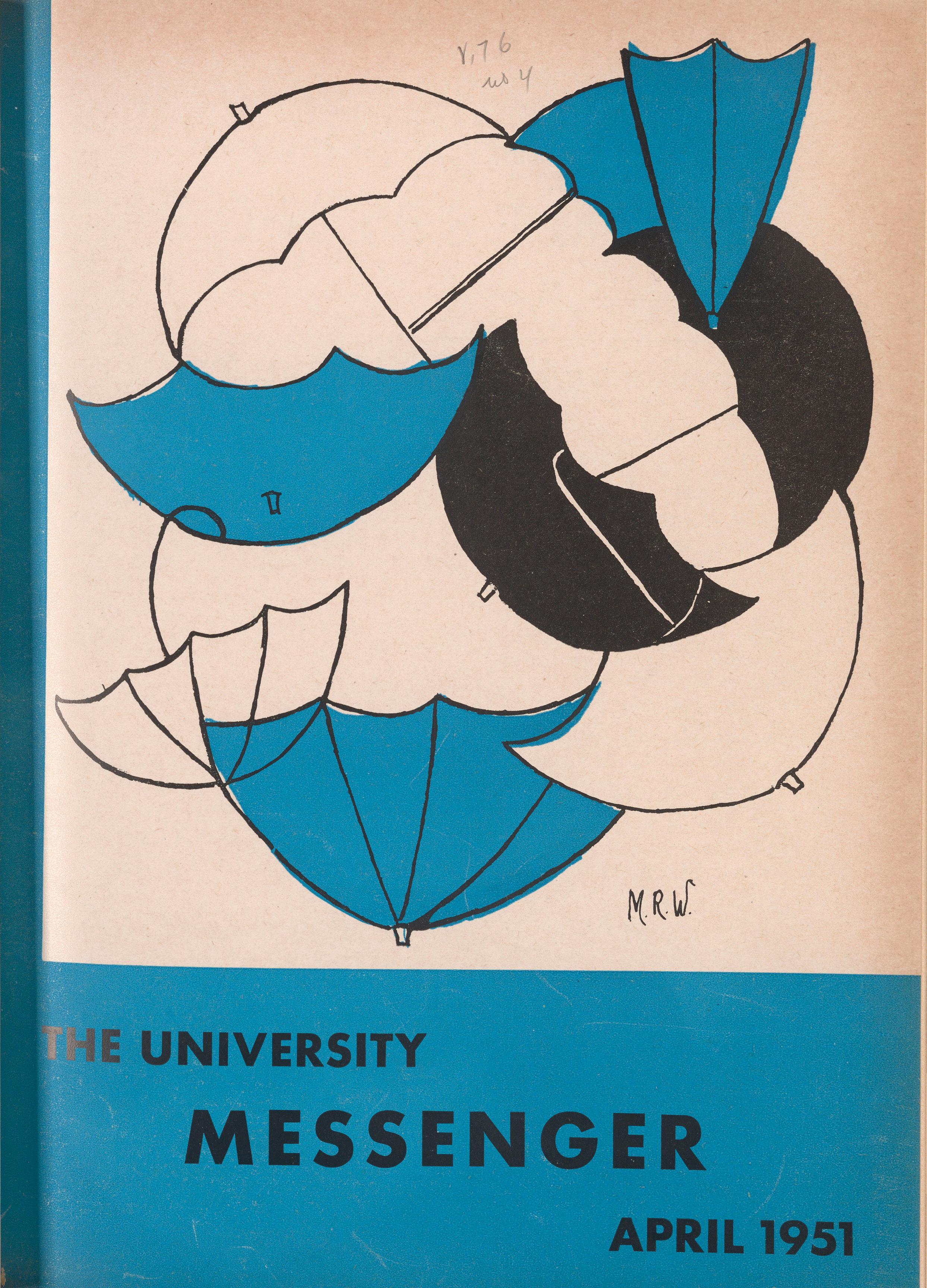
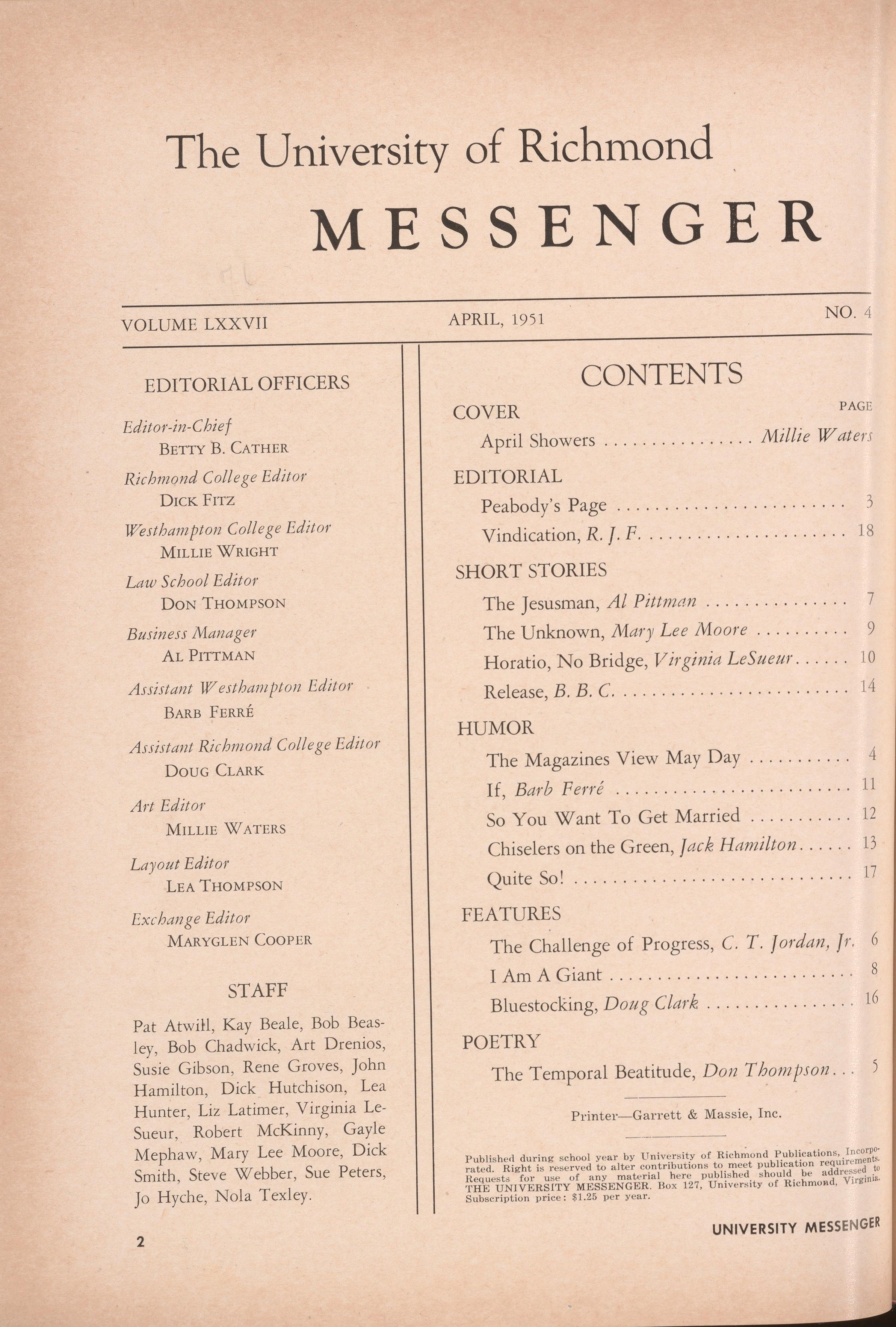



VOLUME LXXVII
EDITORIAL OFFICERS
Editor-in-Chief
BETTY B. CATHER
Richmond College Editor
DICK FITZ
Westhampton College Editor
MILLIE WRIGHT
Law School Editor DON THOMPSON
Business Manager AL PITTMAN
Assistant Westhampton Editor BARB FERRE
Assistant Richmond College
DOUG CLARK
IPEABODY, remain seasonably unseasonable. Spring still reigns with flamboyant excess, tear ducts of robins and collegiates are still d efective, and the senior class of Westhampton looks like a Tiffany showcase. But all a diamond is, in the last analysis, is a bit of carbon gone sophi sticated. At least glass is not pretentious. Mating still continues with the top speed of a malign ant growth Every morning some sparrow in the treetop yodels, but not because he's lost his mate. It always interrupts my early morning readings of Horace. Patrolmen have been doubled throughout the Byrd Park and Basher Dam areas.
Even the faculty goes dewy-eyed. Prof. Grigg mentions Hedy Lamarr's name more frequently and certainly more wistfully, and even Doc Hagquist looks tenderly at the amoral goings on of the l ower animal phyla I understand that the Kefau ver committee next undertakes an investigation of the noctural doings of one unidentified Mr. S. in the psych department. Apparently these complexes and drives occasionally backfire even in the hands of the experts. Now here is an ink blot. A leaf? A stone? An unfound pint? From that we can deduce the little lady's measurements and et c.
As i f academic life weren ' t complicated enough by love and subsequent nonsense , the Greeks just celebrated their week. Any number of air pumps were imported into this area to blow up the sagging muscles of the RC men to at least microscopic size for the athletic feats. In lieu of Olympic laurels to crown the victors' brows, attractive wreaths were ma de from beer tops in keeping with college spirits, and as proof that the ever-wily Greeks utilize t hose materials close at hand. Oh most foul stench of stale alcohol!
We sthampton has made an attempt to slough off tradi tion , as May Day goes aquatic with lobsters and oysters dancing around the May Pole For once the committee has planned. for the light shimmering rain that is one of the quainter May Day customs Unfortunately the comely limbs of the May Court will be swathed , as always , in yards of filmy material that hardly seems as aquatic as a simpl e bathing garment. I mention this discrepancy in the lowest of whispers. Although I personally feel that levis are the best bush apAPRIL, 1951
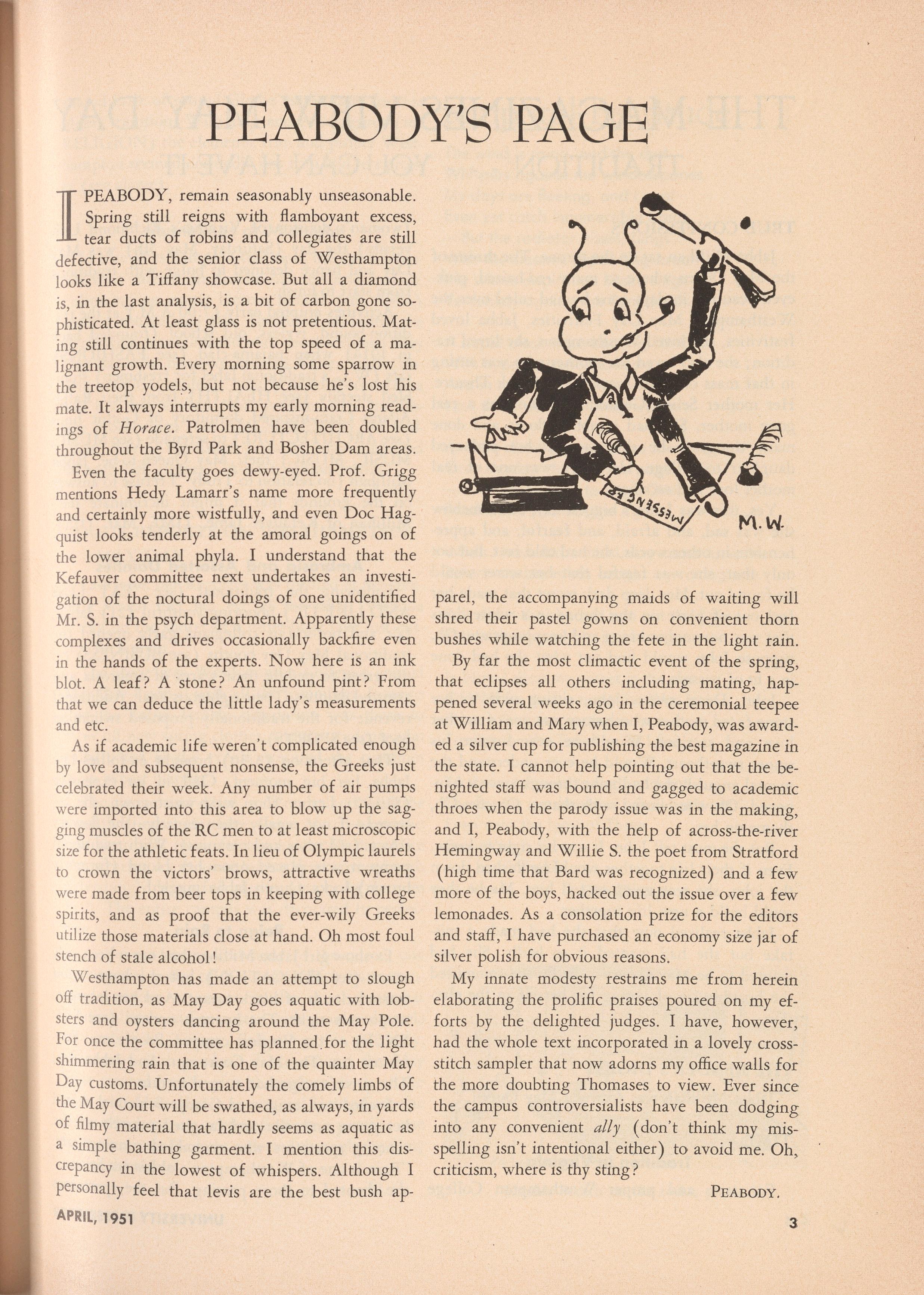
parel, the accompanying maids of waiting will shred their pastel gowns on convenient thorn bushes while watching the fete in the light rain
By far the most climactic event of the spring, that eclipses all others including mating, happened several weeks ago in the ceremonial teepee at William and Mary when I, Peabody, was awarded a silver cup for publishing the best magazine in the state. I cannot help pointing out that the benighted staff was bound and gagged to academic throes when the parody issue was in the making , and I, Peabody, with the help of across-the-river Hemingway and Willie S. the poet from Stratford (high time that Bard was recognized) and a few more of the boys, hacked out the issue over a few lemonades. As a consolation prize for the editors and staff, I have purchased an economy size jar of silver polish for obvious reasons .
My innate modesty restrains me from herein elaborating the prolific praises poured on my efforts by the delighted judges. I have, however, had the whole text incorporated in a lovely crossstitch sampler that now adorns my office walls for the more doubting Thomases to view. Ever since the campus controversialists have been dodging into any convenient ally ( don't think my misspelling isn't intentional either) to avoid me. Oh , criticism, where is thy sting?
PEABODY
Jabba Millihan sat on the throne. The throne of the May Queen where so many red-haired, pinkeyed beauties, in days gone by had ruled over the Westhampton May Day Festivities. Jabba loved festivities, she loved Westhampton, she loved tradition; she also loved her mother who was sitting in that mass of stone faces in the Greek Theatre Her mother Selina Getsindiner, who was a real gone mother. She had scrubbed .floors and done many things to be able to send her pink-eyed daughter to college. Her story was one of real mother love and sacrifice.
Yes, this was Jabba's biggest day, but somehow she was sad, and afraid, and fearful, and apprehensive; in other words, she had cold feet. But not only that, she was fearful that her secret would be found out. Her deep dark secret that made her feel out of place on the throne in a white dress that was now unbecoming and unappropriate. Oh, suppose John would find out what she had done in a fit of passion.
John . Dear, sweet, John, sitting next to her stone-faced mother whose story was one of mother love and sacrifice. Would he ever forgive his sinner sweetheart. Would he ever understand the mental anguish she had gone through since it happened. Oh, she burned with shame. Oh, fie. Oh, shame on her.
But she must tell John. It was his right to know. Even if their life together would be .flushed down the john, she was going to tell him. Maybe they could build a new life together.
Jabba realized now that she had made a mistake but she had wanted it so badly. She had wanted to be May Queen so badly she committed the horrible sin of voting for herself in the election.
- R. F.
(woman's division of Virginia ' s Richmond Un iversity) the day (Saturday, May 5th) was Ma y Day and hence destined to bulge with tradition s from start to finish .
Activities erupted early (7 :00 A.M.) at the tradition-bound, ivyless, old school ( founded back in 1914) when pajama-dad (see FASHIONS ) rats (W.C.'s traditional label for freshmen) stumbled sleepily ( see HEALTH) from their Ralp h Adams Cram-inspired dormitory of Gothic lin es ( see ARCHITECTURE) to serenade ( see MUSI C, MUSIC, MUSIC) their May Queen-to-be, Jabb a Millihan (no relation to Trudy " I refuse to answ er on the grounds that it might incriminate me " Millihan of Kefauver fame, TIME, Mar. 11th ).
Following the traditional ( see "EAT LESS AND LIKE IT " ) honoring youthful ( 21) J abba, fair and not-so-fair collegians gayly opened the traditional May Day booths ( see BUSINESS) on the green to peddle their wares of ambrosia and assorted dainties. Their righteous goal: Addition al revenue for the traditionally proposed swimmi ng pool ( see SPORTS) .
That afternoon ( 3: 30) brought ex-follies l ass Jabba her big moment. Clad in an expens ive ( $ 19.9 S) Lerner Shop wasp-waist gown, she received-if not regally, then eagerly-the .flowery crown ( red roses and petunias) . With traditio nal pomp it was placed upon her blond ( forme rly brown) locks. Queen Jabba giggled.
THE READER'S DIGEST
Jabba Millihan was crowned May Queen. -R.F.
TIME
4
Tradition in Virginia
For trim and proper Westhampton College
Ex-show girl Jabba Millihan had never been very smart ( see EDUCATION) but she knew what massed clouds of black meant. And her inter pretation was right. The heavens opened ( see SCIENCE) on the Virginia campus. People ran. Professors ran. The May Court ran. And Jabba ran. The queen ' s reign had turned to rain.
Soaked and twice-wed Gladys Schlemiel ra ised her green umbrella and laughed coarsely at the running spectators who resembled running rats. "Rain is one of Westhampton's oldest traditio ns," she shouted to those passing. But the specta tors UNIVERSITY MESSENGER
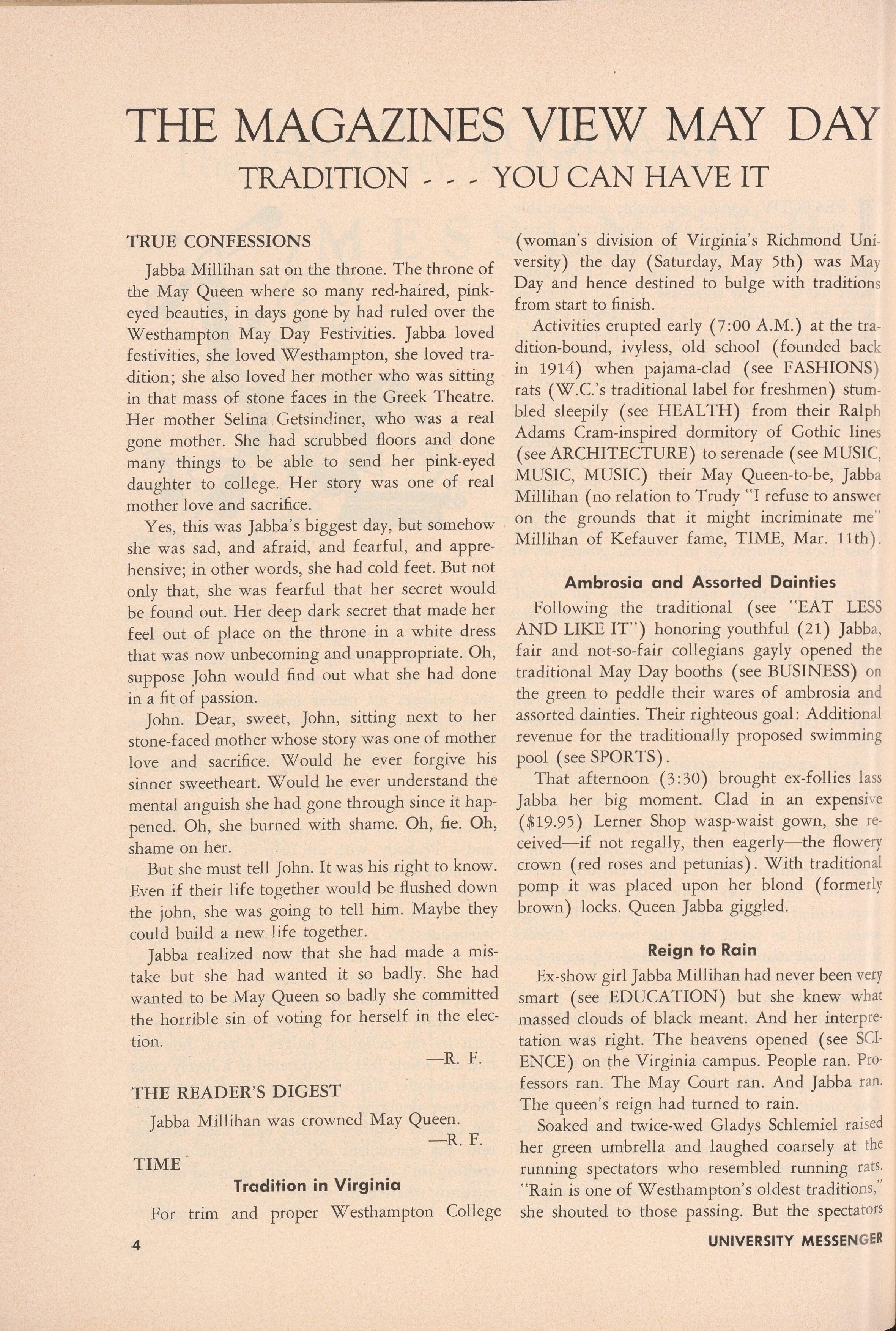
shared little of rotund Gladys' enthusiasm for this oldest tradition. With rain and rats cursing ( see RELIGION) the elements, trim and proper Westha mpton seemed decidedly less trim and less proper ( see above) .
Mumblings at Midnight
In true Westhampton tradition, the day ' s activities w ere carried on despite nature ' s intervention
Following an exotic lantern parade ( see ASIA) around the college lake (polluted in 1946) the celebration was climaxed with the traditional May Day dance in brick-constructed Keller Hall ( studen t activities center). Finally dried Queen Jabba and h er rain-washed court presided over the f estive p roceedings ( see AMUSEMENTS) At midnight, leaving the dance, Jabba Millihan mumbled thr oug h her g iggles, "Ain ' t tradition terr if! " . -A.P .
Last w eek our Reporter was thrilled at the spectacle which met her eye at the small Vir g inia school on the shores of a quiet little lake just outside Richmond.
The scene was Westhampton College ' s annual May D ay Festival with all the trimmings . It seems that t h e entire female population w as there to show off new spr in g clothes , and the students who parti cipated in the events executed the costume s in an expert manner.
The t heme w as Alice in Wonderland, and the most thr illin g thing the r e was a March hare who was we ari n g a beautiful top hat by Dache. Alice was weari n g a soft azure burlap d r ess covered with a fetchi ng ly beautiful muslin jumper by Jacques Fath . T h e ent ~re campus was decorated to perfection
At the coronat ion ceremon y o f the queen , one took special notice of the crow n which was a stunning cr eation in paper mache in a somewhat medieval style and encrusted with simulated pearls and ru bies by Tiffany. Following this ceremony , there w as a stupendous dance around the May Pole crea ted by the girls themselves. Each of the girls wh o danced wore an original Hattie Carnegie dress which gave a pretty effect yet a peculiar one as the sun cast shadow s reflected through the filmy net of the skirts.
-D C.
The wind is rising, and the dust Whispers against the windowpanes. My days are fleeting, and I must Even yet catch innumerable trains. -But the radiator hisses, pings With the steam 's expanding breath (He whom inspiration kisses, sings Yet futilely against the final death.)
A stupid clock ticks, beating TIME With hypermetronomic haste, And in my dully rhythmic rhyme I put dead words to living waste.
A white cloud passes before the sun, Grey shadow darkens the page -Turn your paper to Page One Read the Wisdom of the Age.
When I have fears that I may cease to write Before my brain has caught my racing pen ...
Pull down the shades, turn out the lightReturn the thought to its old regimen.
In Now I drop my verses in the slot Of Will Be, turn among the Was to see If I can find unoccupied a spot To sit in on the Time-bus as I flee.
To strive, to seek, to find, and not The Lord is my shepherd I shall not want Even unto the least of These Easy does it. .. say When?
-Don Thompson.
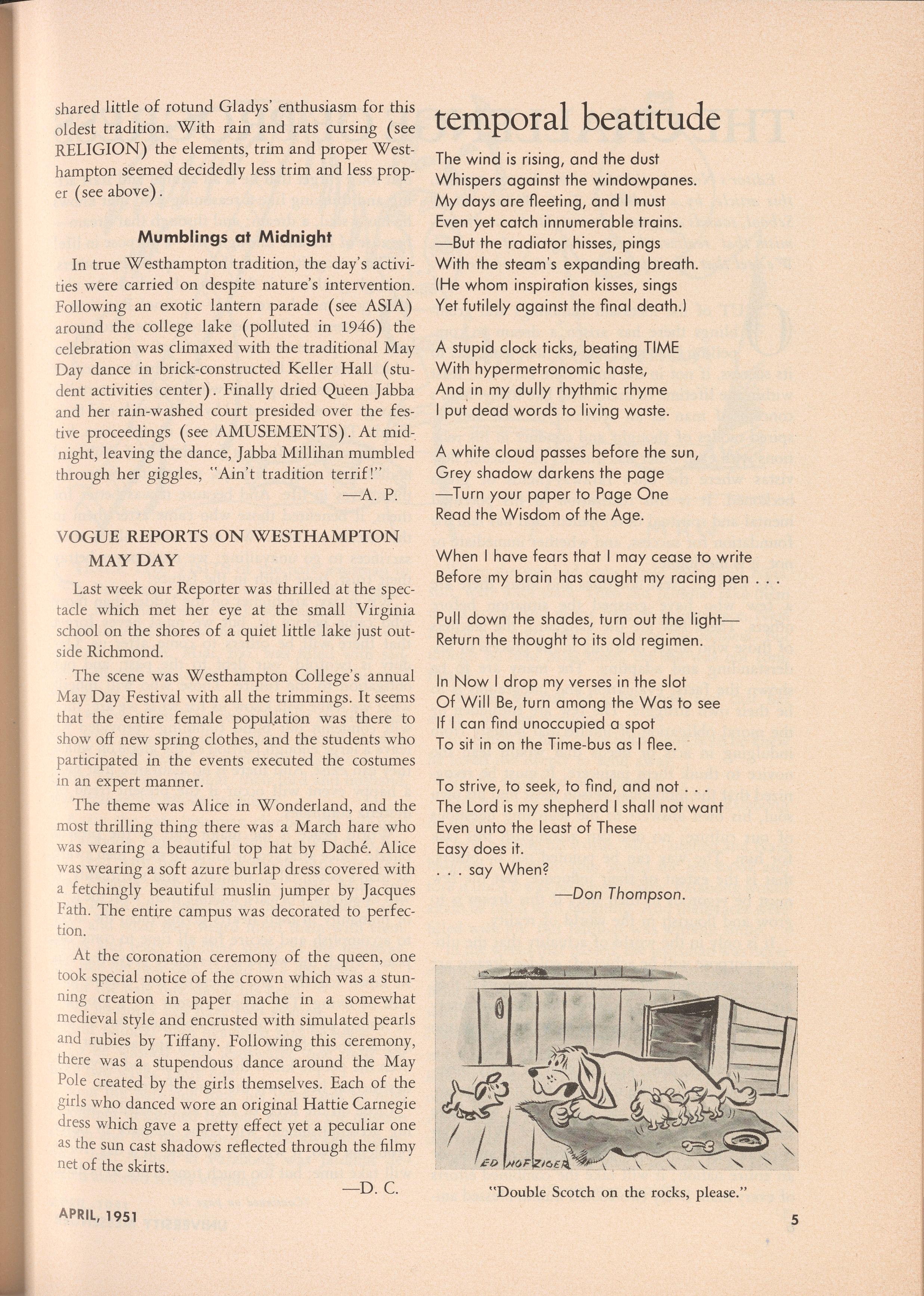
"Double
APRIL, 1951
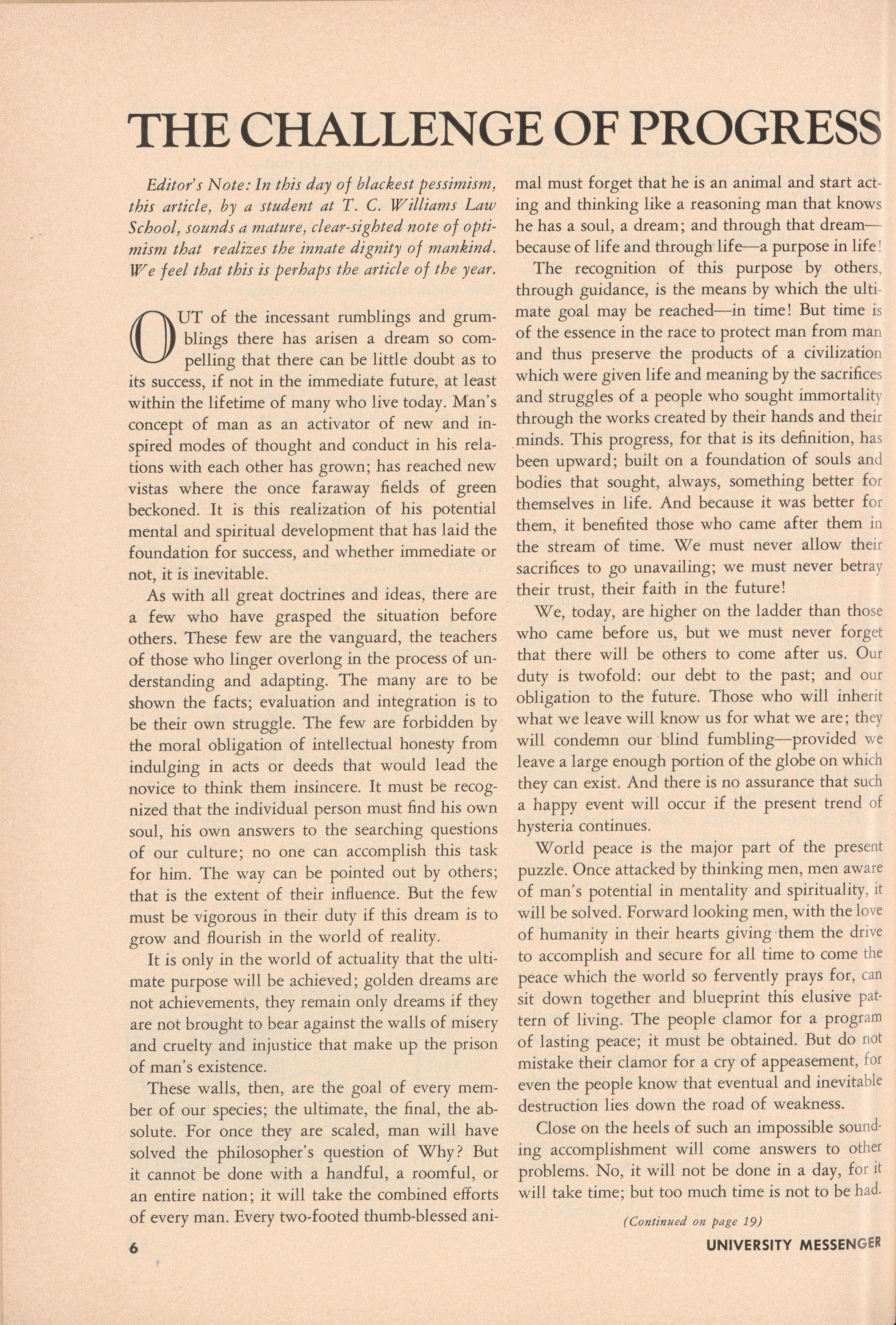
Editor's Note: In this day of blackest pessimism, this article , by a student at T. C. Williams Law School , sounds a mature , clear-sighted note of optimism that realizes th e innate dignity of mankind. Jf / e feel that this is perhaps th e article of the year.
OUT of the incessant rumblings and grumblings there has arisen a dream so compelling that there can be little doubt as to its success, if not in the immediate future, at least within the lifetime of many who live today . Man ' s concept of man as an activator of new and inspired modes of thought and conduct in his relations with each other has grown; has reached new vistas where the once faraway fields of green beckoned. It is this realization of his potential mental and spiritual development that has laid the foundation for success, and whether immediate or not, it is inevitable.
As with all great doctrines and ideas , there are a few who have grasped the situation before others. These few are the vanguard, the teachers of those who linger overlong in the process of understanding and adapting. The many are to be shown the facts; evaluation and integration is to be their own struggle. The few are forbidden by the moral obligation of intellectual honesty from indulging in acts or deeds that would lead the novice to think them insincere. It must be recognized that the individual person must find his own soul, his own answers to the searching questions of our culture; no one can accomplish this task for him. The way can be pointed out by others ; that is the extent of their influence. But the few must be vigorous in their dut y if this dream is to grow and flourish in the world of reality.
It is only in the world of actuality that the ultimate purpose w ill be achieved ; golden dreams are not achievements, they remain only dreams if they are not brought to bear against the walls of misery and cruelty and injustice that make up the prison of man's existence .
These walls , then, are the goal of every member of our species; the ultimate, the final, the absolute. For once they are scaled, man will have solved the philosopher's question of Why? But it cannot be done with a handful, a roomful, or an entire nation; it will take the combined efforts of every man. Every two-footed thumb-blessed ani6
mal must forget that he is an animal and start acting and thinking like a reasoning man that know s he has a soul , a dream; and through that dreambecause of life and through life-a purpose in life !
The recognition of this purpose by other s, through guidance, is the means by which the ultimate goal may be reached-in time! But time is of the essence in the race to protect man from ma n and thus preserve the products of a civilizatio n which were given life and meaning by the sacrifices and struggles of a people who sought immortalit y through the works created by their hands and the ir minds. This progress, for that is its definition, h as been upward; built on a foundation of souls an d bodies that sought , always , something better fo r themselves in life And because it was better fo r them , it benefited those who came after them in the stream of time . We must never allow th eir sacrifices to go unavailing; we must never betr ay their trust , their faith in the future!
We , today, are higher on the ladder than th ose who came before us , but we must never for g et that there will be others to come after us. Our duty is twofold: our debt to the past; and our obligation to the future. Those who will inh erit what we leave will know us for what we are ; th ey will condemn our blind fumbling - provided we leave a large enough portion of the globe on wh ich they can exist. And there is no assurance that such a happy event will occur if the present trend of hysteria continues .
W odd peace is the major part of the pres ent puzzle. Once attacked by thinking men, men aw are of man's potential in mentality and spiritualit y, it will be solved Forward looking men , with the l ove of humanit y in their hearts g ivin g ·them the drive to accomplish and secure for all time to come the peace which the world so fervently prays for , can sit down together and blueprint this elusive p attern of living The people clamor for a prog ram of lasting peace; it must be obtained But do not mistake their clamor for a cry of appeasement , for even the people know that eventual and inevit able destruction lies down the road of weakness .
Close on the heels of such an impossible sounding accomplishment will come answers to o ther problems. No , it will not be done in a day, for it will take time ; but too much time is not to be h ad.
(C ontin ued on p age 19)
SINCE THE VISITS of the pale jesusman to Palabong, Jaldihar was without laughter. Now, he chose to walk alone and little would he speak. And because her lord and husband was without laughter, Miat, too , was filled with sadness- though she carried the first fruit of his seed within her
Not even when Naja revealed that she like Miat was with man-child did Jaldihar rejoice. And in the days that passed , though both his wives grew heavy with sons, Jaldihar, their lord and husband , was strangely without happiness . ,
Again the pale jesusman climbed the hill-road to Palabong. Once more Jaldihar talked with him and r ead with him the jesusbook until the stars. And because they quietly drew near , Miat and Naja heard and understood their husband's sadness; and what they heard filled them with tremblings and tears. Jaldihar spoke of the jesusway. He, like the pale one , would be a jesusman.
But th e pale one shook his head.
No jesusman can have two women.
And Jaldihar with heaviness said he knew .
To be washed with jesuswater, one must not have two wives. Only one.
Soon the pale one took his leave and by high moonlight descended the hill road to the mission station and the pale jesuswife that awaited his re~urn. Left behind at Palabong was Jaldihar dejected and two wives weeping.
APRIL,1951
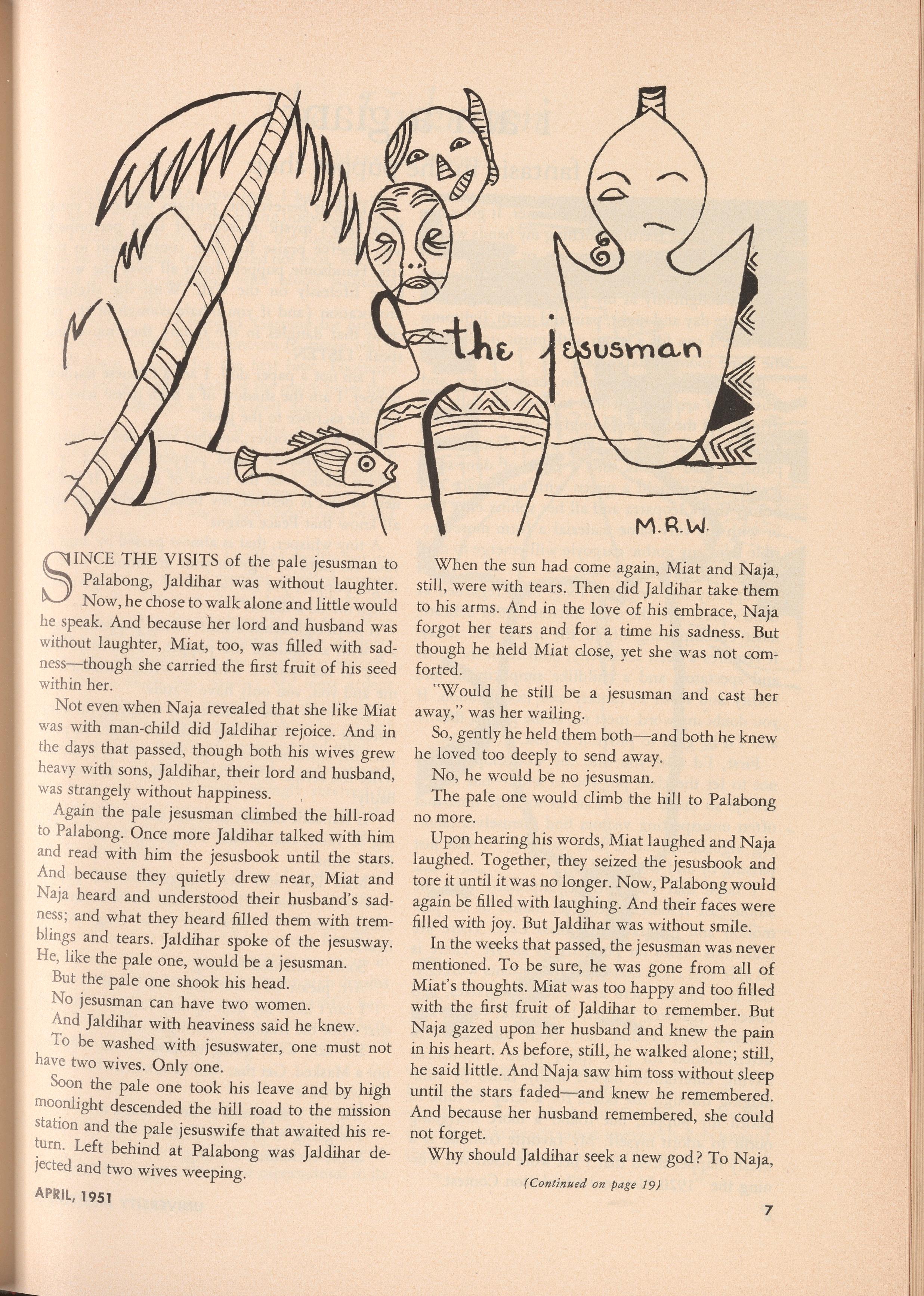
When the sun had come again, Miat and Naja, still, were with tears. Then did Jaldihar take them to his arms. And in the love of his embrace, Naja forgot her tears and for a time his sadness. But though he held Miat close, yet she was not comforted.
"Would he still be a jesusman and cast her away," was her wailing.
So, gently he held them both-and both he knew he loved too deeply to send away .
No, he would be no jesusman.
The pale one would climb the hill to Palabong no more.
Upon hearing his words, Miat laughed and Naja laughed . Together , they seized the jesusbook and tore it until it was no longer. Now, Palabongwould again be filled with laughing. And their faces were filled with joy But Jaldihar was without smile.
In the weeks that passed, the jesusman was never mentioned. To be sure, he was gone from all of Miat' s thoughts. Miat was too happy and too filled with the first fruit of Jaldihar to remember. But Naja gazed upon her husband and knew the pain in his heart. As before, still, he walked alone; still, he said little . And Naja saw him toss without sleep until the stars faded-and knew he remembered. And because her husband remembered, she could not forget.
Why should Jaldihar seek a new god? To Naja,
SECRETLY, I'm a World-Planner. It gives me a God-like feeling watching my hands weave the destiny of an empire or to resurrect bodies buried in strange and intriguing folklore. I laugh delightedly at my power. I am a giant. I can create day and night, pain and mirth, lightning and sun. I can fill a room with music or dissolve the same room in darkness.
Representation, imagination, exaggeration and frustration are living words to one who pulls the strings; but the most meaningful word of all is creation. From a mass of clay, wire, plastic wood, paint, a yard of silk and a piece of dime-store jewelry, I can mold a queen with such grace and beauty that Cleopatra and all her sphinx envy her , or with the very same material a form more horrible than any gothic gargoyle will emerge to defy beauty and spread infection.
Puppetry has long, too long, been regarded as child's play. It is the most intricate, most delicate, most encompassing of all the living arts today. It requires a keen sensitivity, both from the artist and spectator, and a childlike simplicity to find reality and truth in fantasy and exaggeration. If you doubt my word, meet me in the puppet theatre and I'd be glad to prove it to you.
First, I'd take you into the workshop. I'd try not to let the class put you to work-but there's always so much to be done in so little time that often unsuspecting visitors find themselves laboring vigorously before they can say, "I was just passing by and wondered . . "
I hope that you will be impressed with the amount of resources we have, thanks to the promotion and inspiration of Miss Lutz. There are numerous books on puppetry as an art. There is an able tool chest that lends its contents willingly. But best of all there are boxes, and boxes, and boxes of feathers, leather, beads, silk, velvet, and artificial flowers that have been collected with determination for over thirty years. I remember having entertained myself many times by rummaging through the boxes for a scrap of tulle to adorn my puppet, but found a more intriguing outfit to adorn myself. My favorite costume is a musty flapper dress that I bet wore itself out winning the "1920 National Charleston Contest."
8
If Luck is benevolent, perhaps we could ente r Miss Lutz's mystic museum of tired performer s who deserve praise for their contribution to th e arts. Handsome puppets from all over the worl d hang lifelessly on the wall. With the slightes t provocation ( and if you inhale enough of the incense that dangles in the room) they move an d speak. LISTEN:
"I am not a paper doll, I am a Chinese shado w puppet. I am the shadow of a high priest who offers the sacrifice to the gods."
From a dim corner, another voice can be hear d, " I am a Japanese hand puppet. My face is a golden mask. I set the mood of a story. If goo dness or sun is desired, my head is held high and all know that Peace reigns."
A tiny whisper, that is almost passed by, tugs at your ear until it is given your attention. "I am a finger puppet; put me on one of your fingers an d watch me do a dance."
A worn eighteenth-century string puppet is arg uing with a dignified rod puppet, "I am more difficult to manipulate. I have 9 strings attached to me and you, you only have 3 rods!"
Next, maybe you would enjoy watching the class rehearse their show. They make the stage, the puppets, the costumes, the props, the scenery, and even write the script. It's no wonder that rehearsals go badly!
"If someone doesn't start the show soon, I'm going to faint, that's what I'm going to do-fai nt, faint, faint!"
"Miss Lutz and her exaggeration of pup pet movement is for the birds! ! The whole busines s is exaggerated especially how long we rehearse!"
"Some enchanted evening ..
"Art, please be sweet and SHUT UP!"
"I can't hold my arm up any longer-oh God, that's not the trouble, I can't get it down!"
"She said we' re going to have a mass meet ing not a Masked. Get that fool handkerchief from un· der your nose!"
"Oh, am I supposed to be on stage now?"
'Tm going to faint, faint, faint ... "
"Some enchanted evening. " ·
-MILLIE -WATER S. UNIVERSITY MESSENGER
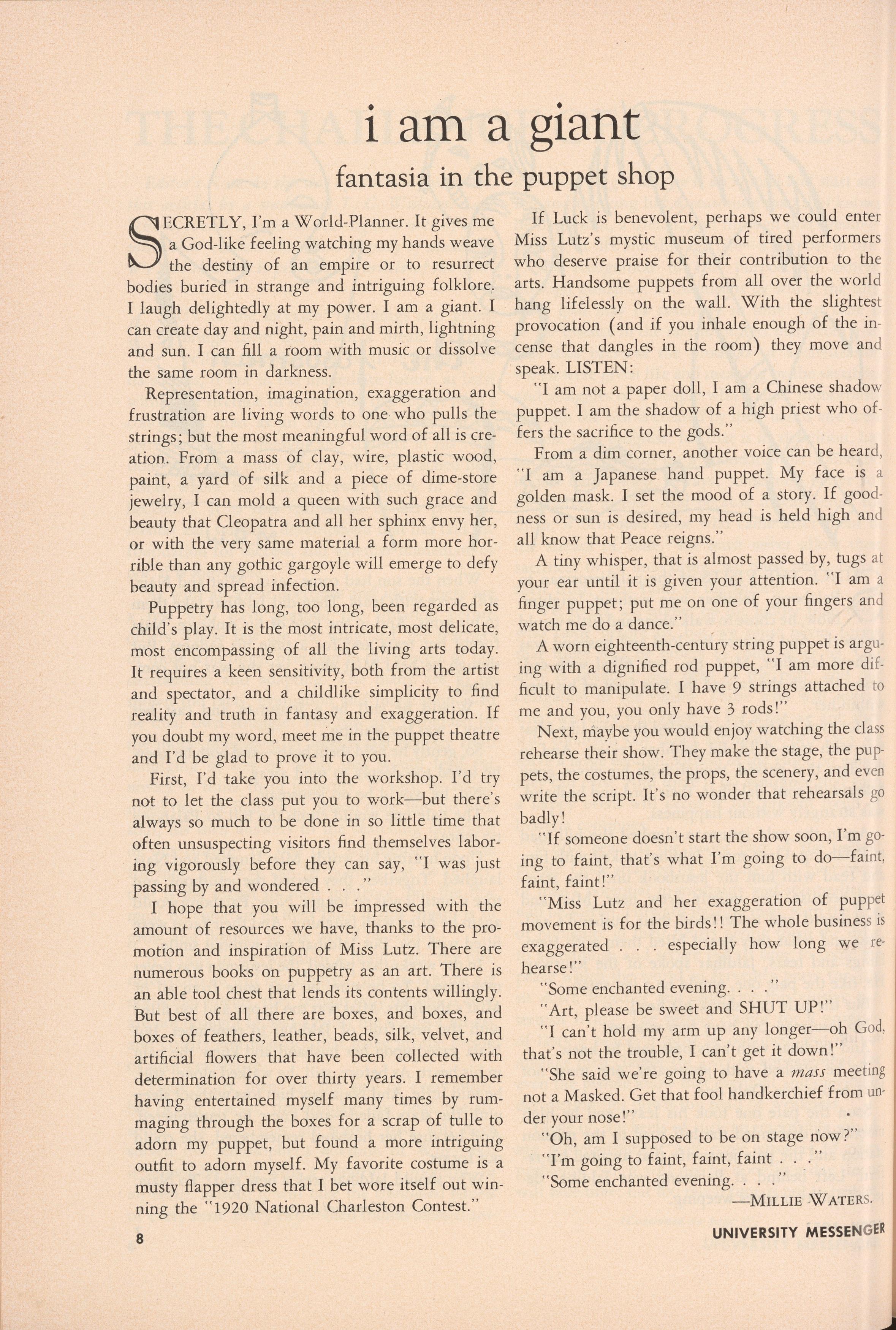
MARY LEE MOORE
XHAD NO IDEA how long I had been running. Fright forced my aching limbs forward as I stumbled wearily through the foggy streets. Wa s he still behind me? I dared not look, but continued running-running, with blood pounding loudly in my ears.
And then . I stopped. Gasping for breath, I listened furtively for the uneven footsteps which I ha d heard tonight for the first time. Footsteps which I recognized because of the many times they had walked through my troubled dreams. And I knew without knowing why, that accompanying that limping walk, would be the overpowering scent of lilacs-always lilacs. But I heard nothing, smelled nothing. Safety encompassed my quivering body but how little I knew how short-lived would be that security.
Five more blocks. . . I walked swiftly but my steps faltered as aching muscles rebelled against more activity. My eyes darted from tree to tree . . each moving shadow brought new fear. Was it just a week ago . . . a month that his shadowy figure first intruded upon my dreams, transforming sleep into restless horror? My most ardent wish wa s always for wakefulness-wakefulness which offered escape from an enemy who stalked the subconscious depths of my tormented mind.
And now . . he had appeared out of nowhere, no longer what my friends jokingly referred to as a figment of my imagination. Those steps-the lilacs. He had been following me . . or was it just anot her dream?
Four more blocks . I heard nothing, and glancing over my shoulder I saw no one. I slowed my steps and tried to remember. I only knew that each night he'd be waiting for me-waiting for drowsiness to overcome my terror in order that he might creep stealthily through dreams that had once been filled with such youthful happiness- dreams that now left me panic-stricken, cold with perspiration and sick from the odor of lilacs.
Thr ee blocks. . No sound save that which I made marred the stillness of the quiet neighborhood. Why had I ever agreed to work late? I kriew why. Anything to keep my mind from dwelling on something which seemed almost supernatural in its APRIL,1951
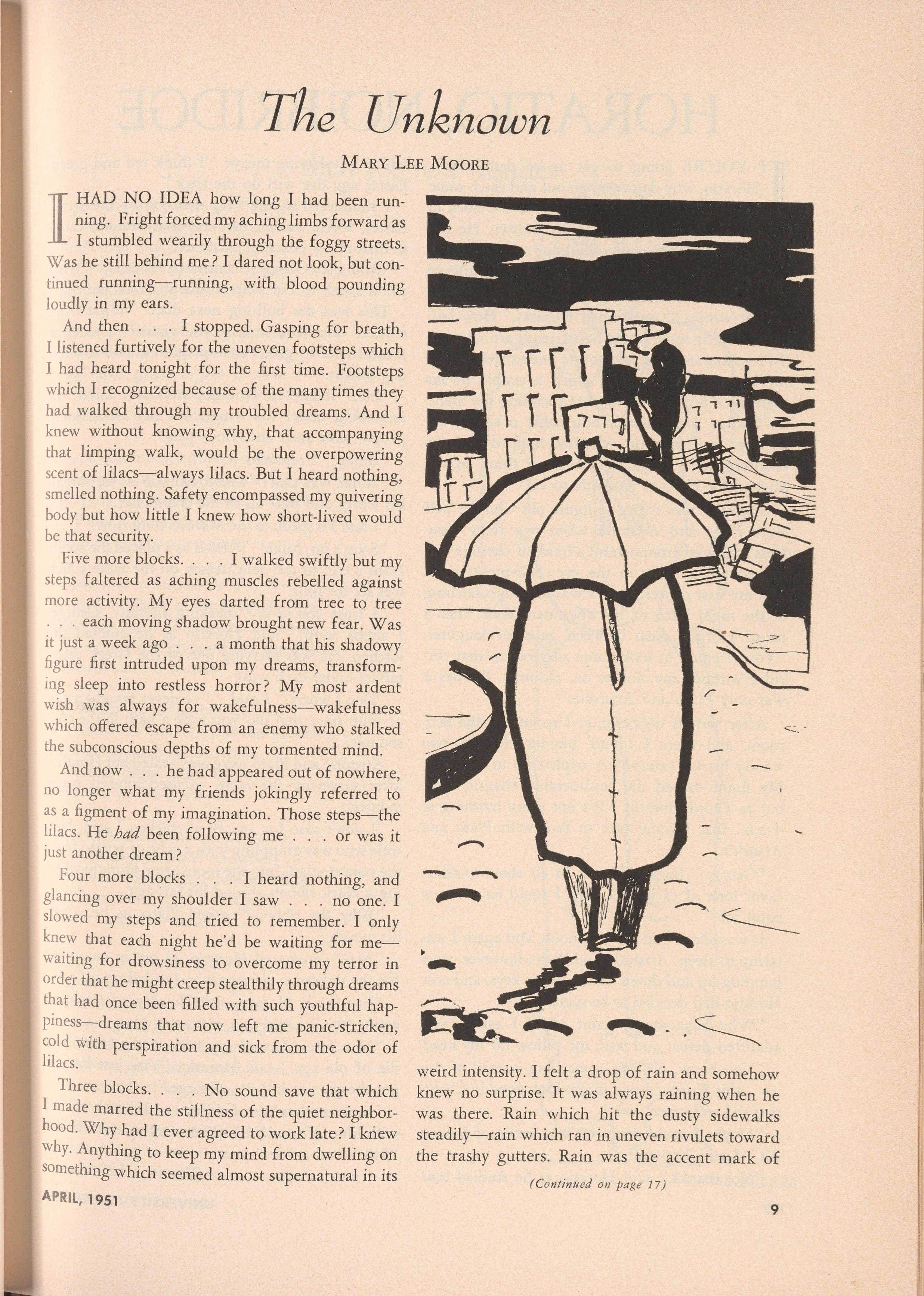
weird intensity. I felt a drop of rain and somehow knew no surprise. It was always raining when he was there. Rain which hit the dusty sidewalks steadily-rain which ran in uneven rivulets toward the trashy gutters. Rain was the accent mark of
(Continued on page 17)
IF YOU'RE going to get up so damn early, Horatio, why don't you go out and catch some worms for your breakfast?" It is 4 o'clock in the morning and Horatio is my rooster. He has awakened me at this ungodly hour every morning since Easter 1948 when he was but a multicolored ball of fuzz.
"Eat worms?" questioned Horatio. "How barbarous! Why some of my best friends are worms." To corroborate his statement he pulled from under my bed my left shoe in which a couple of his segmented acquaintances were spending the night.
"George, your lack of hospitality is simply appalling," said Horatio, who had hopped onto the counterpane. "Why, there's not a thing in the kitchen for Plato or Aristotle to eat!"
Sleepily I was trying to figure out who the hell were Plato and Aristotle when two furry monsters appeared from behind a hunk of chenille and looked me straight in the eye. Self-preservation was my first concern and I was already snatching at the night latch of the apartment door when I heard Horatio gasp between gales of laughter. "You're going to look damn silly out in that corridor without any clothes on, ole man. Besides it was only Plato and Aristotle."
After serious deliberation I re-entered the bedroom, and there I found, besides Horatio, two woolly brown caterpillars tripled up in laughter. My flight caused me considerable chagrin now, but as I told Horatio, "It's not every morning at 4 a.m. that I come face to face with Plato and Aristotle."
"George," began Horatio in an about-to-ask-afavor tone of cackle, "I wish I could have a new paint job."
It was about 3 in the afternoon, and again I was trying to sleep. Aristotle and Plato, however, were jumping up and down on the piano keys, and now Horatio had decided to be sociable.
"Wha-da-ya mean, paint job?" I asked, as I admitted defeat and took the pillow off my head.
"You know, ole boy, something instead of this . . this Easter crap. I might look good in Christmas red and green, too."
"Maybe I could drop you in a kettle of boiling Rit," I said, hopefully.
"No, thanks," said Horatio as he studied him10
self in rriy shaving mirror. "I think red and green Easter egg dye will do the trick."
I shuddered at the very mention of the wor d Easter, for it was on that day that Horatio came to disrupt my peaceful existence.
"And also, George," continued Horatio, "I wish you'd speak to the Martins about Penelope."
This was the bulldog next door. "What's th e matter? She been chasing you again?" I made a mental note to give Penelope a chocolate-covered dog biscuit.
"No," mumbled Horatio, who was intent on scratching under his wing, "it's her fleas. Some people have such obnoxious pets!"
"Amen!" I rejoined.
"What was that?" asked Horatio as he spre ad his wings and flew up to the chandelier.
"I said I'd speak to the Martins tomorrow." .
"Soup 's on, folks!" I yelled as I placed the spoils from a trip to the delicatessen on the table wh ich was set for four.
"I trust you're not speaking literally, Geor ge. I abhor soup!" said Horatio as he entered the kitchen. He was carrying one of the Greek caterpillars under each wing.
" Don't worry," I said, ''I've never bought a can of soup since that day you took a bath in the consomme."
Aristotle and Plato were now seated but Hora tio, after surveying the table, excused himself fo r a moment.
"I don't care for any fried chicken," said Aristotlewhowas grappling with a cube of potato fr om the potato salad. Into the room came Horatio w earing a black ribbon around his left leg.
"Why the ribbon?" asked Plato, as he wiped his mouth.
"Alas!" answered Horatio, "I am in mourn ing for the unknown chicken who lies before us."
"Just think, Horatio, next Sunday we migh t be eating you," I said in a menacing tone.
"Not unless I break my neck in the bathtu b or die of ole age," said Horatio. "You just ha ven't got the guts to kill me, George."
I took another bite of chicken and silently agreed with him. After all, I had been trying since Easter 1948.
-VIRGINIA LESUEU R, UNIVERSITYMESSENGER
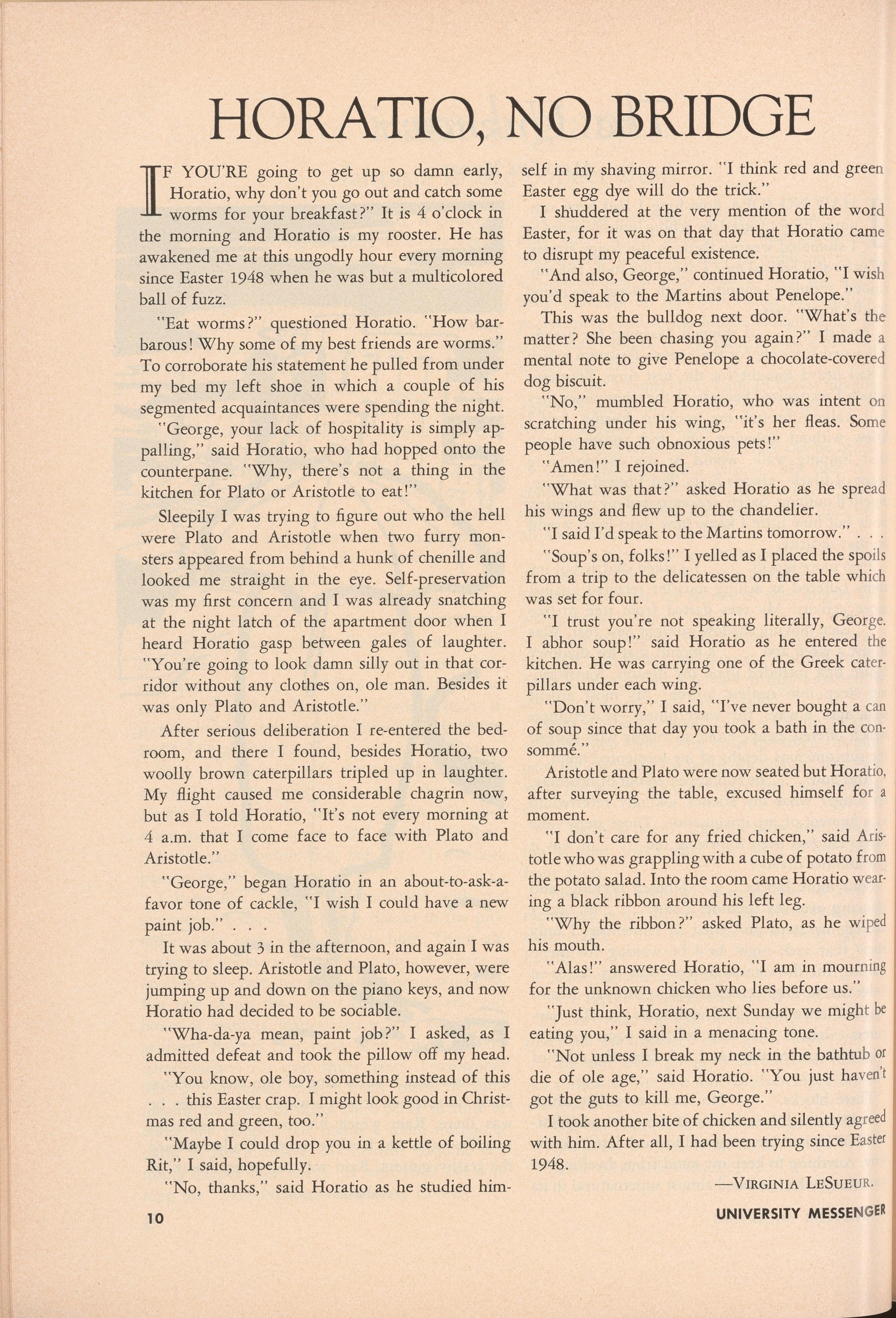
If you can study through the night When roommates off to slumber go, And never pity your sad plight Or never snitch a wink or soBrother, you ' re a wonder!
Jfyou can dress yourself on time, Cuz Johnny said exactly 8:00, And never gripe, or fret, or stew W hen Johnny comes an hour late. Sister, you ' re a wonder!
Jfyo u can break tradition's lines W hen gals for beauty titles vie, And say you like Westhampton girls
Better ' n those from R.P.I. Brother , you ' re a wonder!
Jfyo u who live upon the hill, W hen talking of life's earthly joys, Ca n say there are no men on earth
As good as Richmond College boys, Sister, you ' re a wonder!
lf you can go to football games, And show your spirit in each scream, Then in spite of minus scores, Nev er gripe about the teamBrother , you ' re a wonder!
lf afte r Monday morn 's pop quiz, You remain serene and cool, And e ven though you flunked it flat, Ne ver think your prof a fool, Sister, you're a wonder!
If you can while the night away; Slee p 8 hours and still get A. Ov er -cut when in the mood. Ma nage to thrive on college food. Still like school with summer sun. Always get assignments done. Listen full of fascination
To e very speech in convocation. If you ca'n do these things and more Brother, you're what we're looking for!
APRIL, 1951
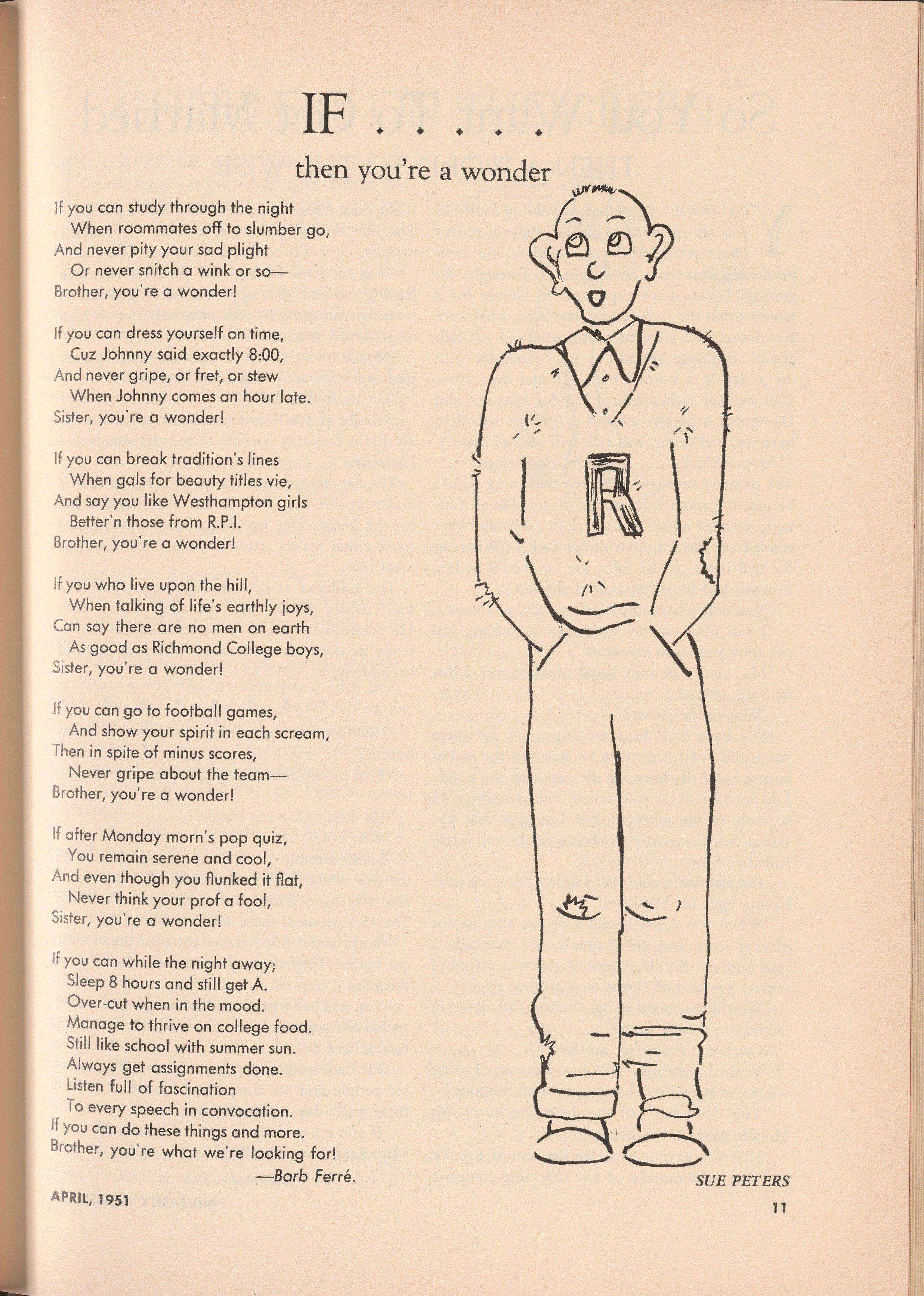
-Barb Ferre.
You FOOL! y OU blind, stumbling fool! Do you realize what a blessed state is yours? Don't you cherish your freedom and independence? Have you no insight, no foresight, no gunsight? You don't expect me to believe for a moment that the "where have you been, what were you doing, who were you with, what did you talk about" existence appeals to you? Consider with me a day in a normal marriage and then agree with me that such a state is nice for Mommie and Daddy but a person without a stronger will than have we, will falter, will fall, will stall (I hope!).
Seven o'clock the alarm clock rings. . . . The damned fool who invented that thing should be put in a room with eternal gongs. (In all fairness, we must admit that the clock probably didn't result from the holy state of wedlock.) "Where in the hell is my comb? John, get up. You'll be late to work and breakfast is cold anyway."
"You didn't have to cook it so early, you know."
"From now on, my little anemic jackass, you can cook your own breakfast."
"My, you're in your usual pleasant mood this morning, Angel."
"Where's the paper?"
"We have had the same paper boy for three years and for three years he has had the rather boring habit of throwing the paper on the porch. I do not wish to tax your rather limited intelligence so early in the morning, but I suggest that you take a chance on his habit being rather well established and look on the porch."
'Tm just damn glad that I didn't ask if we were having eggs for breakfast."
"When you come home, will you stop by the grocery store and get 2 quarts of buttermilk, 2 quarts of sweet milk, 1 pint of cream, a pound of butter, a pound of cheese, and a dozen eggs?"
"Would you mind either writing that down or moving to a dairy farm?"
"Can't you remember anything?"
"Yeah, I remember that five years ago I asked you to be my wife. That was my first mistake."
"You don't have to stay here you know. My Mother gave us this house."
"Hell yes, gave it to us for the sum of $10,000 and for three months of her charming company.
12
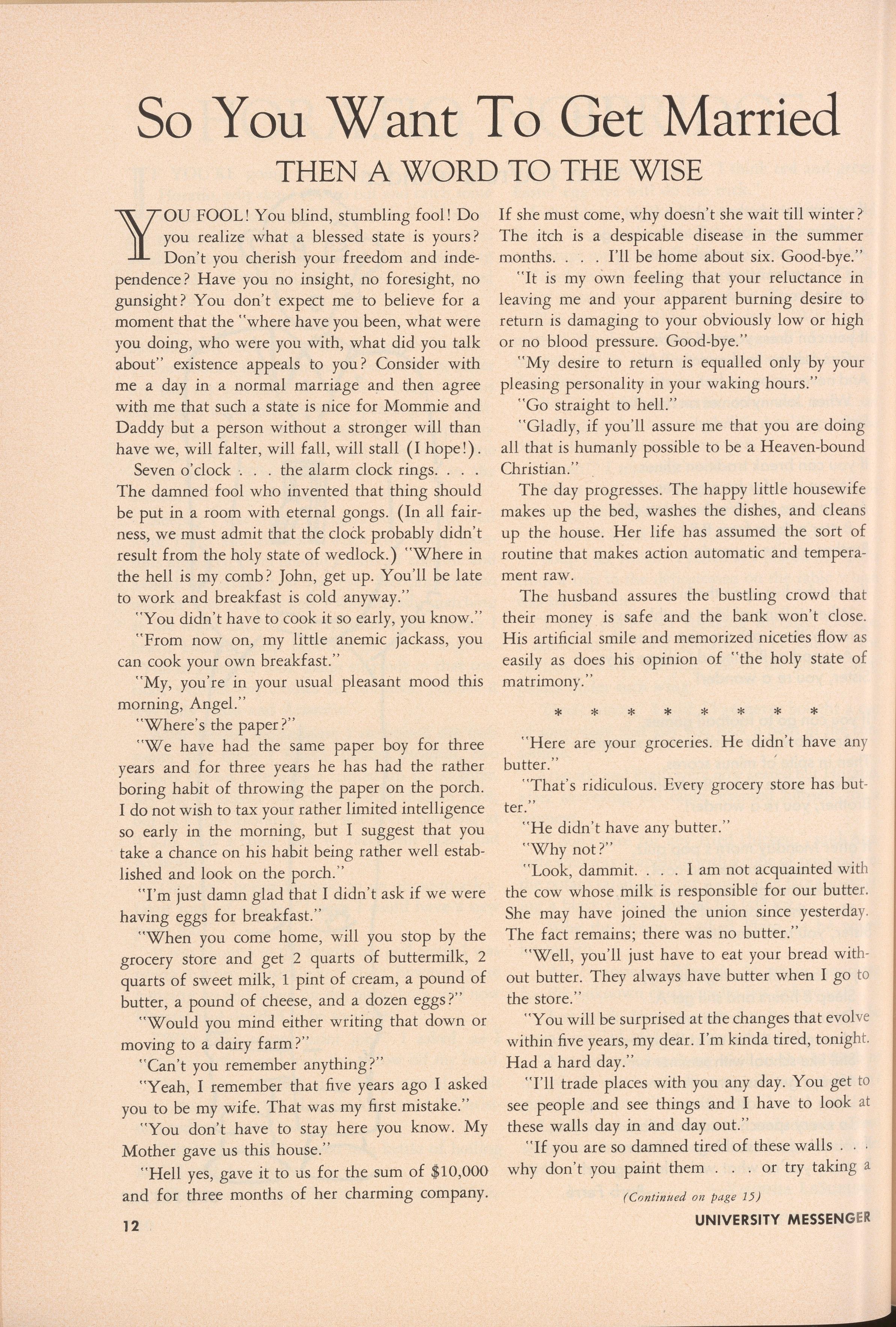
If she must come, why doesn't she wait till winter? The itch is a despicable disease in the summer months .... I'll be home about six. Good-bye."
"It is my own feeling that your reluctance in leaving me and your apparent burning desire to return is damaging to your obviously low or high or no blood pressure. Good-bye."
"My desire to return is equalled only by your pleasing personality in your waking hours."
"Go straight to hell."
"Gladly, if you'll assure me that you are doing all that is humanly possible to be a Heaven-bound Christian."
The day progresses. The happy little housewife makes up the bed, washes the dishes, and cleans up the house. Her life has assumed the sort of routine that makes action automatic and temperament raw.
The husband assures the bustling crowd that their money is safe and the bank won't close His artificial smile and memorized niceties flow as easily as does his opinion of "the holy state of matrimony."
* * * * * * * *
"Here are your grocenes. He didn't have an y butter."
"That's ridiculous. Every grocery store has butter."
"He didn't have any butter."
"Why not?"
"Look, dammit. . . . I am not acquainted wit h the cow whose milk is responsible for our butte r . She may have joined the union since yesterda y. The fact remains; there was no butter."
"Well, you'll just have to eat your bread without butter. They always have butter when I go to the store."
"You will be surprised at the changes that evolve within five years, my dear. I'm kinda tired, tonigh t. Had a hard day."
'TU trade places with you any day. You get to see people and see things and I have to look at these walls day in and day out."
"If you are so damned tired of these walls why don't you paint them . . . or try taking a (Crmtin11ed on page 15)
UNIVERSITYMESSENGER
THE AVERAGE duffer tends to let the par buster's 250-yard drives frighten him to defeat. The solution to this dilemma is the key to faraway success which I now offer to ~eterans of the rough.
The whole "trick" is to make the good golfer play against an imctginary golfing phenomenon rather than against you, his opponent. Sound impossible? For proof I'll relate my sly machinations in a recent divot duel I had with a fell ow of a rival fra ternity who consistently shoots in the 70's. To avoid embarrassment I'll call him B.M.P.
I devoted the first four holes of our match to pleasant conversation.
" Say B-, did you check that little gal with the big blue eyes and short brown curly hair at the Del ta Phi dance?"
" Did I! She was kind of stacked, wasn't she?" he said.
" I noticed she was giving you the glad eye."
I now had B.M.P.'s complete confidence and from here on out he would believe anything I told him.
At the end of four holes of playing straight golf, I was two down. On the long par 5 fifth hole, B.M.P. smashed a tremendous drive 260 yards down the middle of the fairway. I was unimpressed and selected this moment to begin my campaign. As we walked up to his ball, I commented, "Damn, B.M.P., you sure creamed that one! Must be nearly 290 yards."
T his last statement served to tell B.M.P. that I was fully aware of his driving power. On the sixth hole, a short par 4, B.M.P. laid into one and almost drove the green. I now introduced my imaginary golfing phenomenon.
As we approached B.M.P.'s drive I said, "Hey, B-, ever play Raymond Beckpinch ?"
I chose the name Raymond Beckpinch because I knew that it would be vaguely familiar to my opponent and not arouse his suspicion. B.M.P. replied in the negative and I proceeded to describe the fabulous smashes that this fictitious golfer hits off the tee.
" He's a real slugger. Whacks some drives 270 yards," I said.
For the next twelve holes I subtly praised Ra ymond Beckpinch and his mighty swat. B.M.P. APRIL, 1951
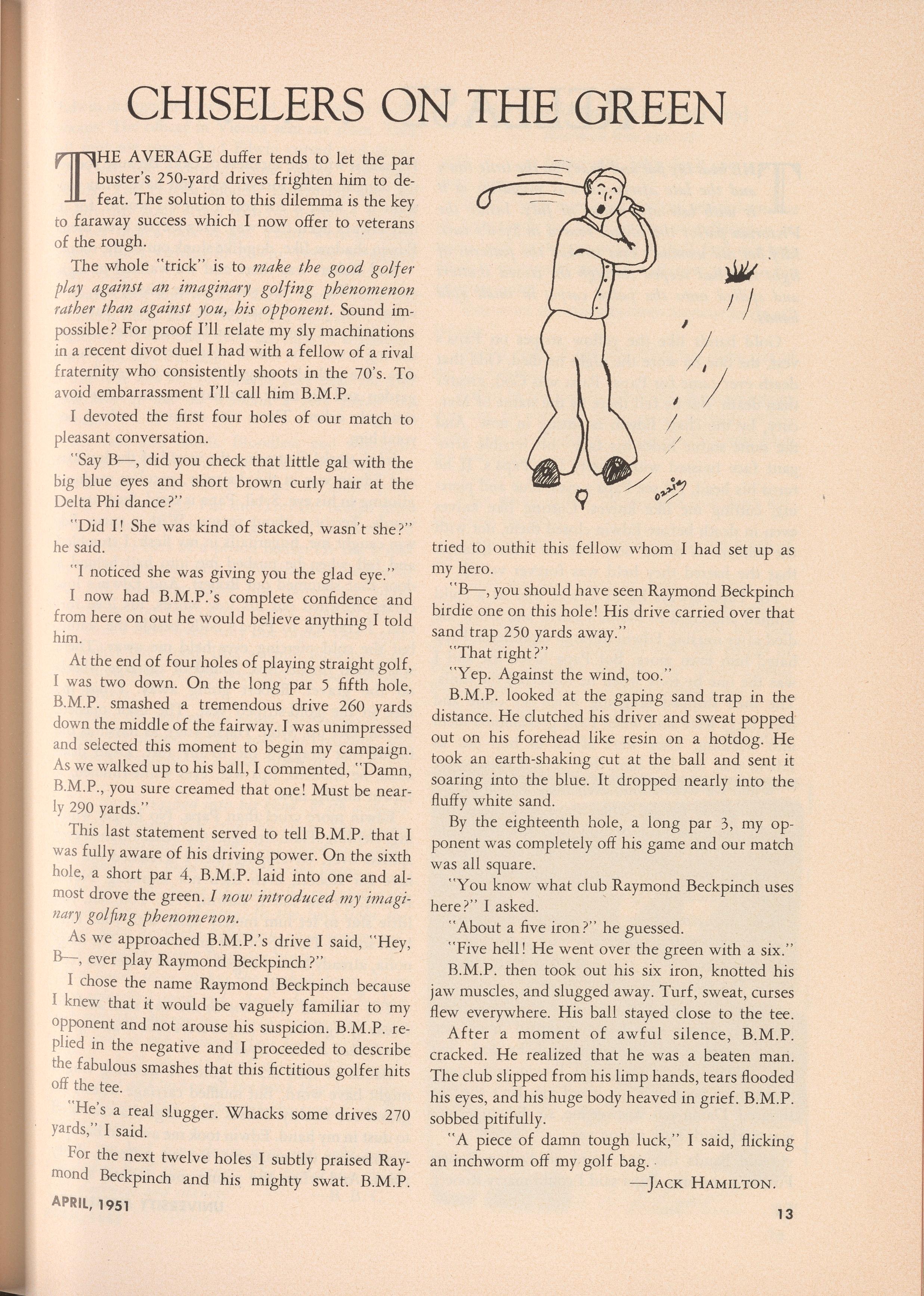
tried to outhit this fellow whom I had set up as my hero.
"B-, you should have seen Raymond Beckpinch birdie one on this hole! His drive carried over that sand trap 250 yards away."
"That right?"
"Yep. Against the wind, too."
B.M.P. looked at the gaping sand trap in the distance. He clutched his driver and sweat popped out on his forehead like resin on a hotdog. He took an earth-shaking cut at the ball and sent it soaring into the blue. It dropped nearly into the fluffy white sand.
By the eighteenth hole, a long par 3, my opponent was completely off his game and our match was all square.
"You know what club Raymond Beckpinch uses here?" I asked.
"About a five iron?" he guessed.
"Five hell! He went over the green with a six."
B.M.P. then took out his six iron, knotted his jaw muscles, and slugged away. Turf, sweat, curses flew everywhere. His ball stayed close to the tee.
After a moment of awful silence, B.M.P. cracked. He realized that he was a beaten mari. The club slipped from his limp hands , tears flooded his eyes, and his huge body heaved in grief. B .M.P. sobbed pitifully.
"A piece of damn tough luck," I said, flicking an inchworm off my gol f bag. ·
- JACK HAMILTON
THE heat lay fiat and heavy on the little town and the late afternoon was soundless as it is with late afternoons in July. Inside the Victorian parlor the silence roared in Sybil's ears. Idly her old woman's eyes stroked the patterns of light that had seeped through the closed shutters and spilled onto the faded carpet in small gold bands.
Gold bands like the yellow stripes on Papa's vest, the one he wore the night he died Odd that death ever came for Papa. Papa was God, greater than death. But he fell there by the statue of Mercury, by the chair Edwin is sitting in now. And the same statue hides his face-his terrible arrogant face twisted with cruelty like Papa's. If he turns his head, I'll see Papa's eyes, blue and piercing, cutting me like knives. Cutting like knives even in death before Edwin closed them, not with the tenderness of an only son but with triumph that the hatred they held was forever veiled.
For Papa always hated Edwin who as a child whined and cried in Mama's skirts, and when she died after nursing Edwin through diphtheria, Papa hated him even more. But Papa loved me and I was the one he took when he inspected the mills. The men stopped laughing when we came and their faces were shut when Papa goddamned them into working. They were afraid of him just as Edwin was, but like him, they obeyed Papa.
When we were alone, even then, Edwin would not cringe as he did when Papa was there, but would fight me, as boys do, and his eyes were cruel when his fingernails found my flesh to leave it red and sometimes bleeding. And even then as a child, I hated him.
The sun glinted on th e colored miniature beside her that was a young girl with pale gold hair and white shoulders rising from a seagreen ball dress. She watched it, remembering.
The night of my first ball. Papa said I was beautiful. My mirror said I was beautiful in my seagreen moire dress. She's beautiful, by god, isn't she, Edwin? Papa said, and Edwin was silent, cursing me because Papa loved me. Isn't she? he shouted. Damn you, answer me, sir. Edwin's voice was dark with hate saying yes.
Gold bands like the braid on Ensign Robert Fowler's uniform. Papa said I could marry Robert.
14
He said it with the sureness of God. Because you' re my daughter and forever will you have what you want if I want it for you. I knew I would, for it had always been that way. Hawk-eyed even then , Edwin shadow-like, dog-like slunk out of the room .
And Robert was there and we waltzed to hig h sweet violins. In the shadows he kissed me, lip s warm and parted that made my body turn to strange liquid. And again and again in the carriag e driving home. His hands were warm on my shou lders. We picked a magnolia from the tree in th e garden and his body was hard against mine th at strangely ached. There was nothing, nothing beyond him.
Sibyl, stark! Shattering the world of the last ki ss and Edwin was in the doorway, peculiar madne ss glinting in his eye. Sybil, Papa is dead. Steel-strong words. Terror without reason. With a curse, Edwin caught me, fingernails in my flesh. I stumble d and fell when he pushed me into hall behind a door that slammed out Robert. And Edwin's low curses drowned out his low words, his love fo rever. I crawled to Papa's body beside the statu e, but the cold piercing eyes held me away. The re was blood on his lips. Sound of carriage whe els on the gravel. Robert going away. I hid my face in the gold-striped vest. The door open ed. Edwin. Get up, Sybil. Harsh voice as harsh as the hands that dragged me to my feet. Dead dead dead, he shouted, lips wet, eyes white-rimmed . I, Edwin finally, now.
Edwin more cruel than Papa. No longer wh ining, yielding. Hate strong in the white-rimmed eyes spilled over, enveloping me I screamed out my love for Robert, even then not knowing. Ne ver Robert, no one but I, Edwin, ever. You slut, you little slut to let him merely dally with you. T hin high sound. The rip of the green moire. The magnolia, already brown edged crushed under his feet. Cloying sweet smell of death.
The sun had sunk low in the sky now and the bands of light on the carpet were thin drawn gold She looked at them sighing.
Bands of thin drawn gold. A wedding ring I might have worn. But muffled carriage wheel s on gravel are finality. Kisses and magnolia crumbled to dust in my hand. Edwin took me away to Europe. I remember the museums, the art galleries, dusty ruins. And when the young men looked at me, UNIVERSITYMESSENGER
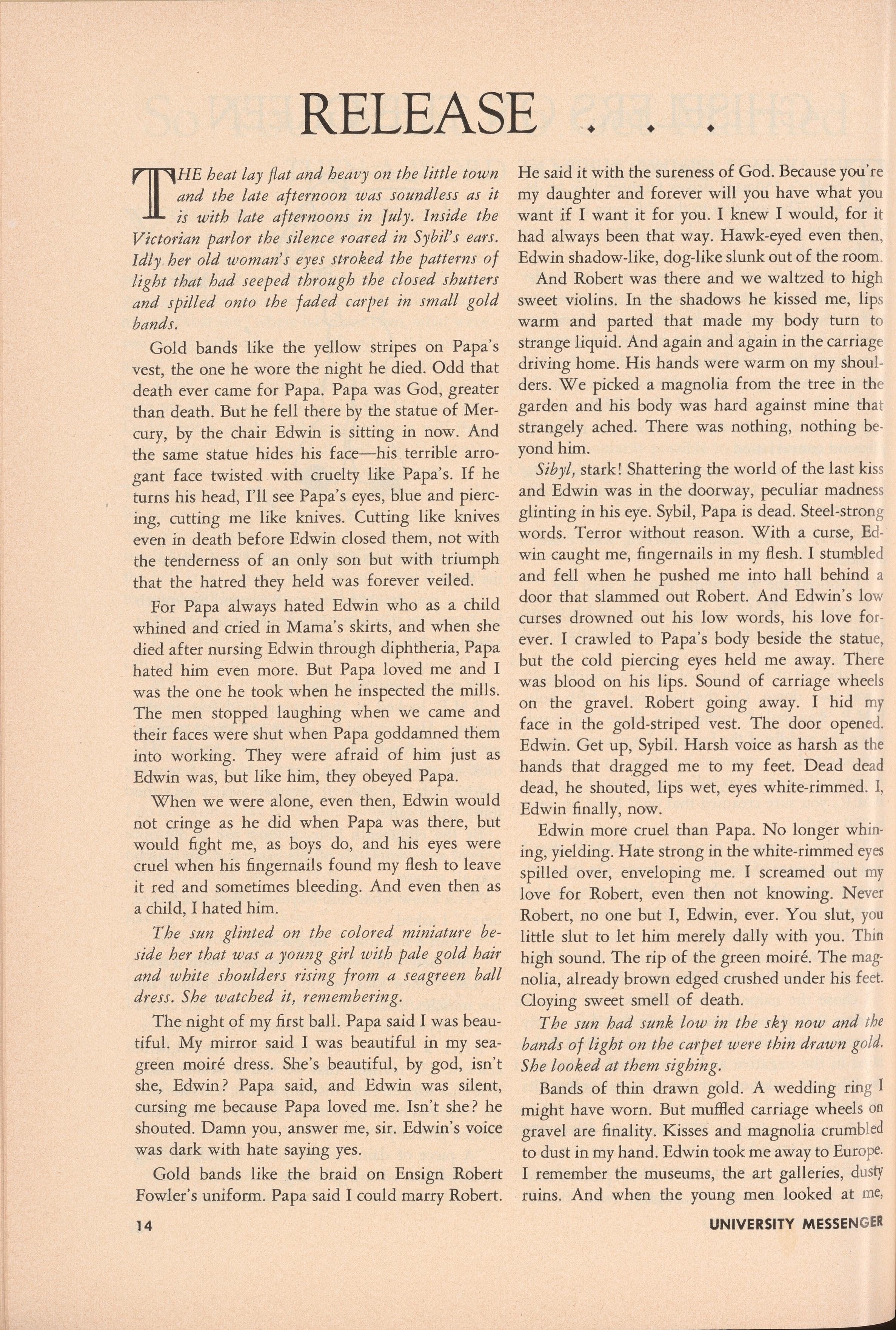
Edwin dragged me away. That night locked in our rooms. The officer in Vienna sent me roses. They all sent me roses. And Edwin cursed and raved. Oh God, the agony of those nights. The cruel h ands. The crueler mouth. Destroying me, my beauty. My body ached with his madness. By and by they didn't look at me. 'J_'herewere no mor_e roses. And I yielded to Edwm. Better to submit than resist.
Days came and went. I didn't know. Now the house on Carey Street. When did we come. I don't remember. Now, not even the dust of magnolia. Only pain and wanting.
She rose and the big mirror gave back the dim reflection of an old woman, a very faded old woman.
My face and hands. Bloodless and w~inkl~d. Yesterday my hair was pale gold and my ltps ltke petals. Last night Robert kissed_ me under m~gnolias. And tonight I'm shell, brittle, beaten thm. W here, when did the days go. Gold bands on the carpet. Steel bars of a prison house. He sits acr~ss the room from me, dark in the shadows, dark with evil. And Mercury beside him, poised for flight. For release clay feet cannot realize. Beyond Edwin life. And I have lived only one night. One night, oh God, I felt blood, life, warmth. Edwin-foul, loathsome devil. A shut door. To oppose him once and forever.
Sil ently she crossed the room. Her hands closed around the statue. Edwin was still reading, undisturbed. Footfalls of a mad, old woman are very light .
T h e statue crashed into his head. With a cry he slump ed forward, fell from his chair. She sprang on him, breathing heavily. And again and again she po unded his head with the bronze statue.
She stood up. Scent of magnolia mingled with dust. Violins were playing. In the half light the mirror gave back the reflection of a young girl, white shoulders rising from sea green.
Her hands were sticky. She looked down. They were splotched with red. And when she looked back i nto the mirror the lovely creature had vanished, and an old woman's face leered at her.
Wit h a half sob, half laugh she wiped her hands on her skirt and picked up the book that had fall en on the floor. After a moment she turned off the reading lamp.
The sun had gone down now and gold bands had fa ded from the carpet. The parlor was filled with darkness and silence. -B. B. C.
APRIL, 1951
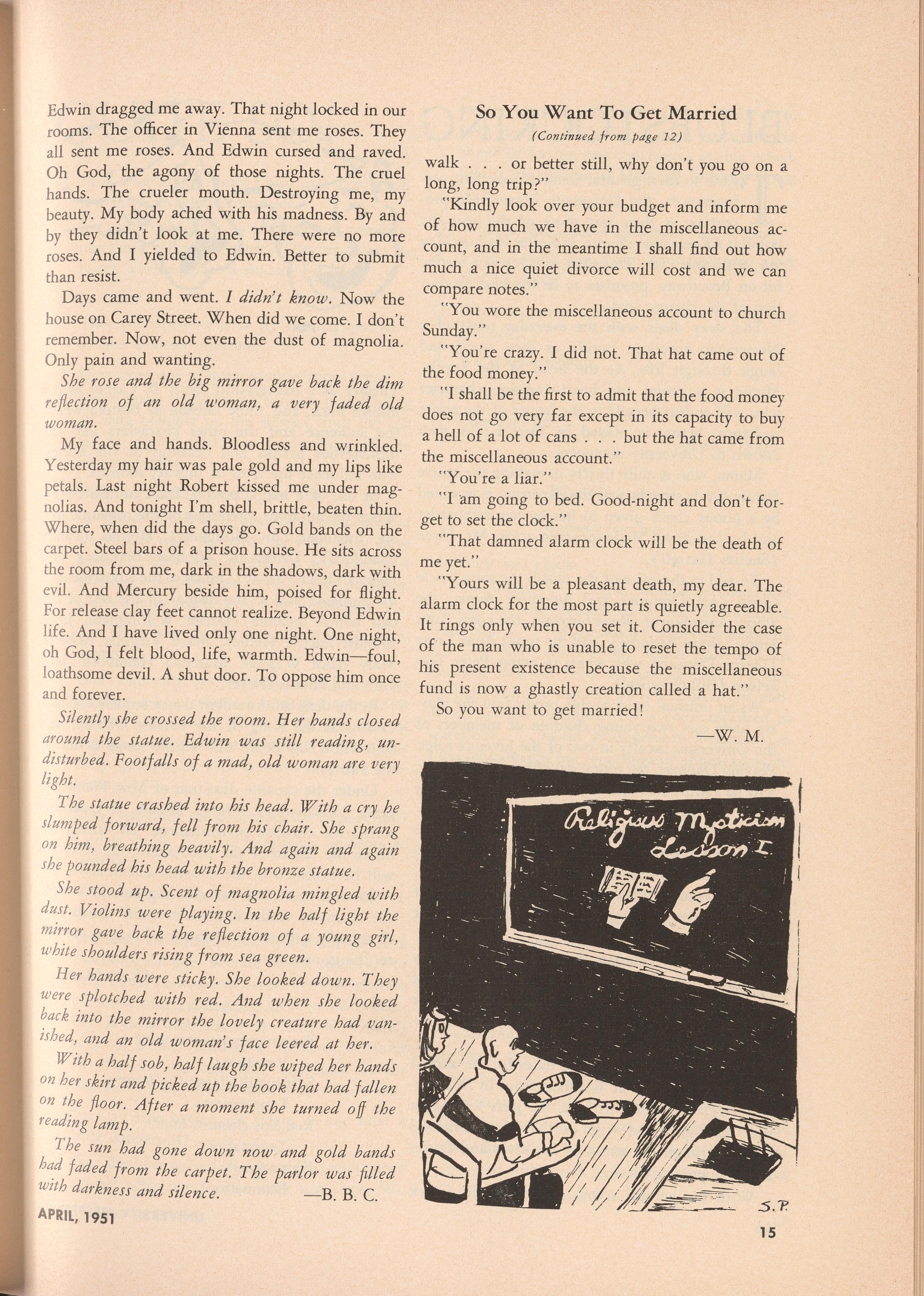
(Continued from page 12)
walk ... or better still, why don't you go on a long, long trip?"
"Kindly look over your budget and mform me of how much we have in the miscellaneous account, and in the meantime I shall find out how · much a nice quiet divorce will cost and we can compare notes."
"You wore the miscellaneous account to church Sunday."
"You're crazy. 1 did not. That hat came out of the fo~d money."
"I shall be the first to admit that the food money does not go very far except in its capacity to buy a hell of a lot of cans . . . but the hat came from the miscellaneous account."
"You' re a liar."
"I llm going to bed. Good-night and don't forget to set the clock."
"That damned alarm clock will be the death of me yet."
·
"Yours will be a pleasant death, my dear. The alarm clock for the most part is quietly agreeable. It rings only when you set it. Consider the case of the man who is unable to reset the tempo of his present existence because the miscellaneous fund is now a ghastly creation called a hat. "
So you want to get married!
-W.M.
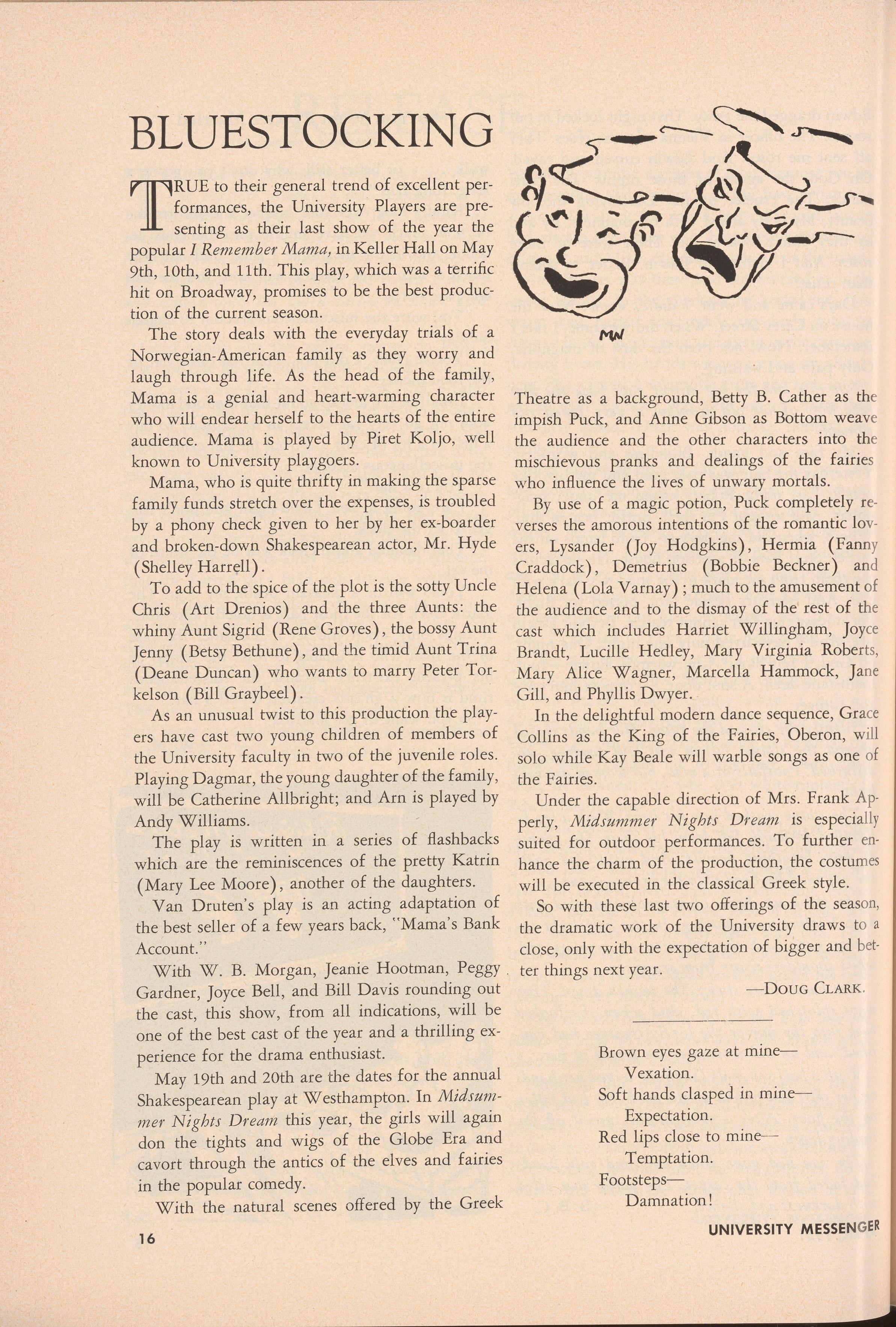
TRUE to their general trend of excellent performances, the University Players are presenting as their last show of the year the popular I Remember Mama, in Keller Hall on May 9th, 10th, and 11th. This play, which was a terrific hit on Broadway, promises to be the best production of the current season.
The story deals with the everyday trials of a Norwegian-American family as they worry and laugh through life. As the head of the family , Mama is a genial and heart-warming character who will endear herself to the hearts of the entire audience. Mama is played by Piret Koljo, well known to University playgoers.
Mama, who is quite thrifty in making the sparse family funds stretch over the expenses, is troubled by a phony check given to her by her ex-boarder and broken-down Shakespearean actor, Mr. Hyde ( Shelley Harrell) .
To add to the spice of the plot is the sotty Uncle Chris ( Art Drenios) and the three Aunts: the whiny Aunt Sigrid (Rene Groves), the bossy Aunt Jenny (Betsy Bethune), and the timid Aunt Trina (Deane Duncan) who wants to marry Peter Torkelson ( Bill Graybeel) .
As an unusual twist to this production the players have cast two young children of members of the University faculty in two of the juvenile roles. Playing Dagmar, the young daughter of the family, will be Catherine Allbright; and Arn is played by Andy Williams.
The play is written in a series of flashbacks which are the reminiscences of the pretty Katrin (Mary Lee Moore), another of the daughters.
Van Dru ten's play is an acting adaptation of the best seller of a few years back, "Mama ' s Bank Account."
With W. B. Morgan, Jeanie Hootman, Peggy Gardner, Joyce Bell, and Bill Davis rounding out the cast, this show, from all indications, will be one of the best cast of the year and a thrilling experience for the drama enthusiast.
May 19th and 20th are the dates for the annual Shakespearean play at Westhampton In Midsummer Nights Dream this year, the girls will again don the tights and wigs of the Globe Era and cavort through the antics of the elves and fairies in the popular comedy.
With the natural scenes offered by the Greek 16
Theatre as a background, Betty B. Cather as th e impish Puck, and Anne Gibson as Bottom weav e the audience and the other characters into th e mischievous pranks and dealings of the fairie s who influence the lives of unwary mortals.
By use of a magic potion, Puck completely r everses the amorous intentions of the romantic lo vers, Lysander (Joy Hodgkins), Hermia (Fan ny Craddock), Demetrius (Bobbie Beckner) an d Helena (Lola Varnay); much to the amusement of the audience and to the dismay of the rest of the cast which includes Harriet Willingham, Joyce Brandt, Lucille Hedley, Mary Virginia Rober ts, Mary Alice Wagner, Marcella Hammock, Ja ne Gill, and Phyllis Dwyer.
In the delightful modern dance sequence, Gr ace Collins as the King of the Fairies, Oberon, will solo while Kay Beale will warble songs as one of the Fairies.
Under the capable direction of Mrs. Frank Apperly, Midsummer Nights Dream is especially suited for outdoor performances. To further enhance the charm of the production, the costu mes will be executed in the classical Greek style.
So with these last two offerings of the season, the dramatic work of the University draws to a close, only with the expectation of bigger and better things next year
- DOUG CLARK
Brown eyes gaze at mineV exation.
Soft hands clasped in mineExpectation.
Red lips close to mine-Temptation.
FootstepsDamnation!
UNIVERSITYMESSENGER
Q . Prof, what is this rumor I hear that there's really a purpose behind test week?
A. It's quite true. The faculty has just voted for more and better test weeks. They stimulate the mind. They prepare a student for life.
Q . For life?
A. They prepare a student for the unexpectedto meet disaster unafraid.
Q. How does one prepare to meet these tests?
A . Quite easily . Preparation consists in collecting all data possible on the subject since the last testing period and then memorizing all important points.
Q. Does that insure passing the test?
A . Of course not. It is beyond comprehension that we would quiz students on what they have learned. They would get by too easily-it w ould not prepare them for life. Life is a strugg le ; we must teach them how to struggle.
Q. Are there any secrets to your struggle techn iques?
A. Quite naturally, yes. For one thing, it is always good to ask questions found in footnotes or obscure illustrations. There is also the trick of req uiring a ·student to complete a three-hour essay question in twenty minutes. Very frustra ting!
Q. D on ' t you think these methods are rather cruel ?
A. Life is cruel. We are preparing students to meet life.
Q. So far all the benefits have been for the students. What about your side?
A. We have advantages too. We are living in a psychological age. We are taught not to try to keep down pent-up emotions. We can restrain our selves only because we know relief is coming. It does with test week. Then we lose all sense of shame. We leer at students, we scout for cheatin g, we ask nasty questions, we act like stinkers , but after it is all over , we feel fine.
Q. Isn' t all this letting off steam at one time a litt le dangerous?
A. No. We have solved that by giving tests either a little before or a little after test week . We APRIL, 1951
let the student think that we are doing it to help them but actually it is to keep them in shape by having one continuous testing schedule It also keeps us from all blowing up at once.
Q. What do the students feel about all of this?
A. Some of them love it and come back year after year for more
Q. What happens when they get tired of the process?
A We graduate them.
Q. Then what?
A. They face life . -BARB
Unknown (Conti nued f ro m page 9)
bleakness and gloom.
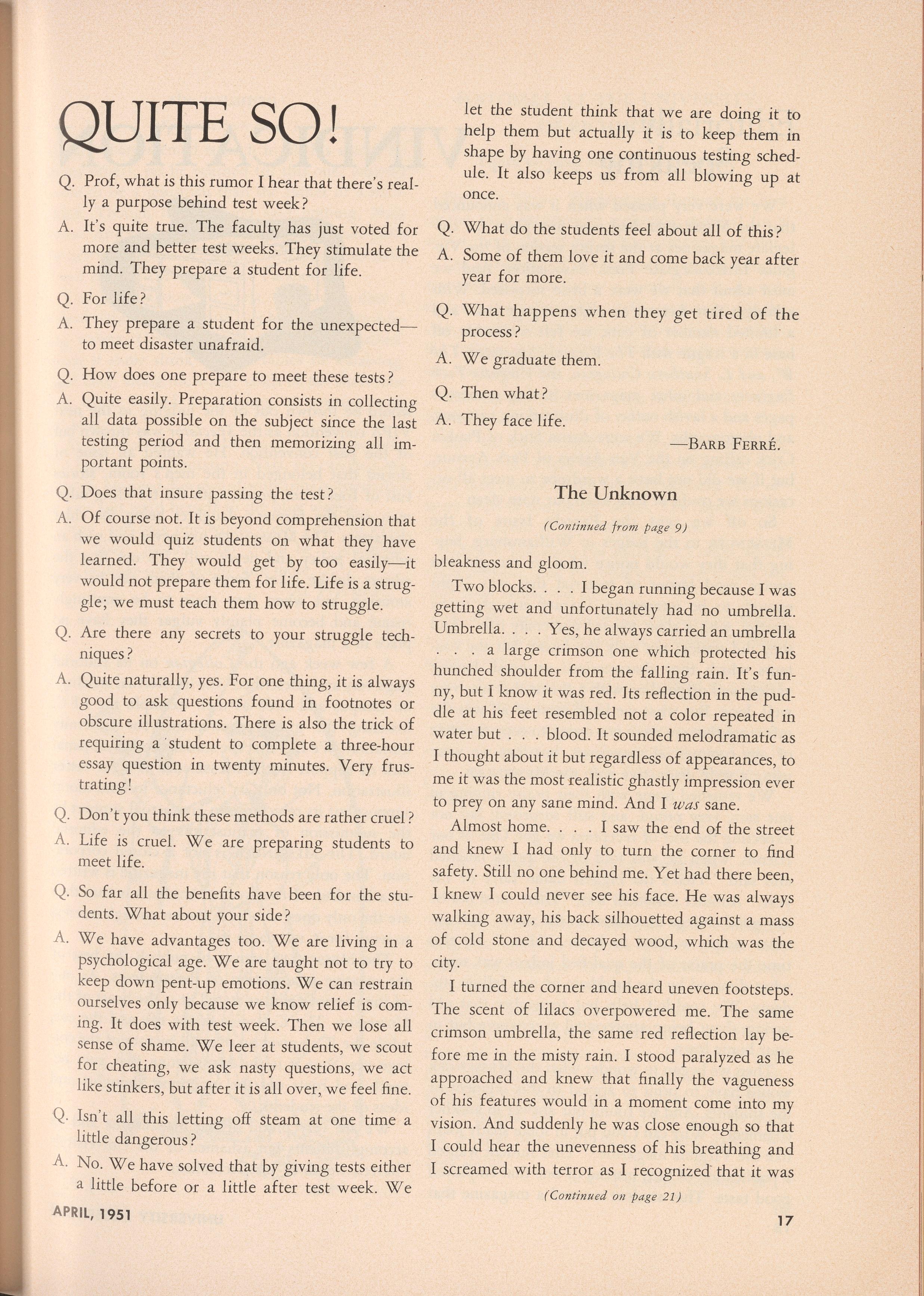
FERRE.
Two blocks. . . I began running because I was getting wet and unfortunately had no umbrella. Umbrella. Yes , he always carried an umbrella . . a large crimson one which protected his hunched shoulder from the falling rain It's funny, but I know it was red. Its reflection in the puddle at his feet resembled not a color repeated in water but . blood . It sounded melodramatic as I thought about it but regardless of appearances, to me it was the most realistic ghastly impression ever to prey on any sane mind. And I w as sane .
Almost home. . . I saw the end of the street and knew I had only to turn the corner to find safety . Still no one behind me Yet had there been, I knew I could ne ver see his face. He was always walking away, his back silhouetted against a mass of cold stone and decayed wood, which was the city
I turned the corner and heard uneven footsteps. The scent of lilacs overpowered me The same crimson umbrella , the same red reflection lay before me in the misty rain . I stood paralyzed as he approached and knew that finally the vagueness of his features would in a moment come into my vision And sudden! y he was close enough so that I could hear the unevenness of his breathing and I screamed with terror as I recognized · that it was (C ontinued on page 2 1 )
We were very pleased when it was announced that the MESSENGER had won first place for collegiate magazines at the spring session of the Virginia Intercollegiate Pr.ess Association. And we must admit that we were a little surprised. With a budget that dictates an eighteen-page issue and a limited number of cuts, we felt somewhat off base in a league with The Virginia Spectator, The W. and L. Southern Collegian, the Virginia Tech Engineer and other magazines having numerous pages and a lavish outlay of illustrations, cartoons, and photographs. We were Arron Slick of Punkin Crick calling on the Van As tors of Park Avenue, but if we did not have a wardrobe to meet all occasions we could at least keep our nose clean.
So off we sent the Parody Issue of the MESSENGER to the judges in Williamsburg, hoping that they would notice what we thought was pretty good layout of material that was "light enough to be interesting, literary enough to be worthy, with a slant toward university life." And they did notice; not only the layout but the contents which they characterized as good, having variety and originality, with a theme that was very well done. But what we liked most of all was the inference that we were not trying to copy the style of any commercial magazines, but that we were using a style distinctive with the MESSENGER.
We returned home with their praise ringing in our ears, very proud, and still surprised; but not expecting the sort of reception we got. One of our friends, when he was told of our prize, laughed and said, "That's the biggest damn farce of the year." Another comment was, "There must not be any good college magazines in the state " Still another simply wanted to know, "How? " By this time the praise of the qualified judges was somewhat dimmed by the brickbats of our fellow students. We couldn't help but remember that old saying about being appreciated everywhere but in your home town.
Then we began to wonder what the MESSENGER would have to print to appeal to this segment of the students. And we found our answer in another comment. "Why can't you put in some shady jokes like the Virginia magazine?" That student wanted a publication of filth instead of one that employed good taste. That student wanted a magazine that 18
would be thrown out of the judging in the nex t VIP A convention as the Spect ator was thrown out of the past convention. He wanted an issue of stories that belonged in the men ' s room , stori es full of four-letter words, with the traveling salesman and the farmer's daughter being the chief characters. The MESSENGER has never had such an editorial policy and never will. It's not that the editors dislike jokes. Some of them can be very amusing, but when they cease to be amusing ly risque and become plainly vulgar they have n o place in a magazine.
A few week ago the Collegian on its editor ial page very aptly described "the intellectual sterilit y" on campus and cited as their example the I.F. C. lowering the grade requirements for fratern ity initiation. We feel that the student bodies ' abysmal Jack of support to the MESSENGER is a far bett er illustration. Not only its reluctance to lend mo ral support but its reluctance to give actual support by the submission of manuscripts to the editor ial board. The MESSENGER is not a dosed corpo ration. The only reason that the magazine is writ ten by a handful of overworked students is that they are the only ones who have shown enough inter est to work for it, not damn it.
The MESSENGER strives to publish the best of the creative imagination of the students. As one of the previous editors stated, it is the heart of the University. The Collegian is the eye and the ear, while the Web gives an over-all picture of the college year, but it is the MESSENGER that goes beneath and roots out the innermost thoughts and ideas of the students.
We are very proud of the MESSENGER and its accomplishments but ashamed of the Universi ty's "barren womb of intellectualism."
-R.J. F. UNIVERSITYMESSENGER
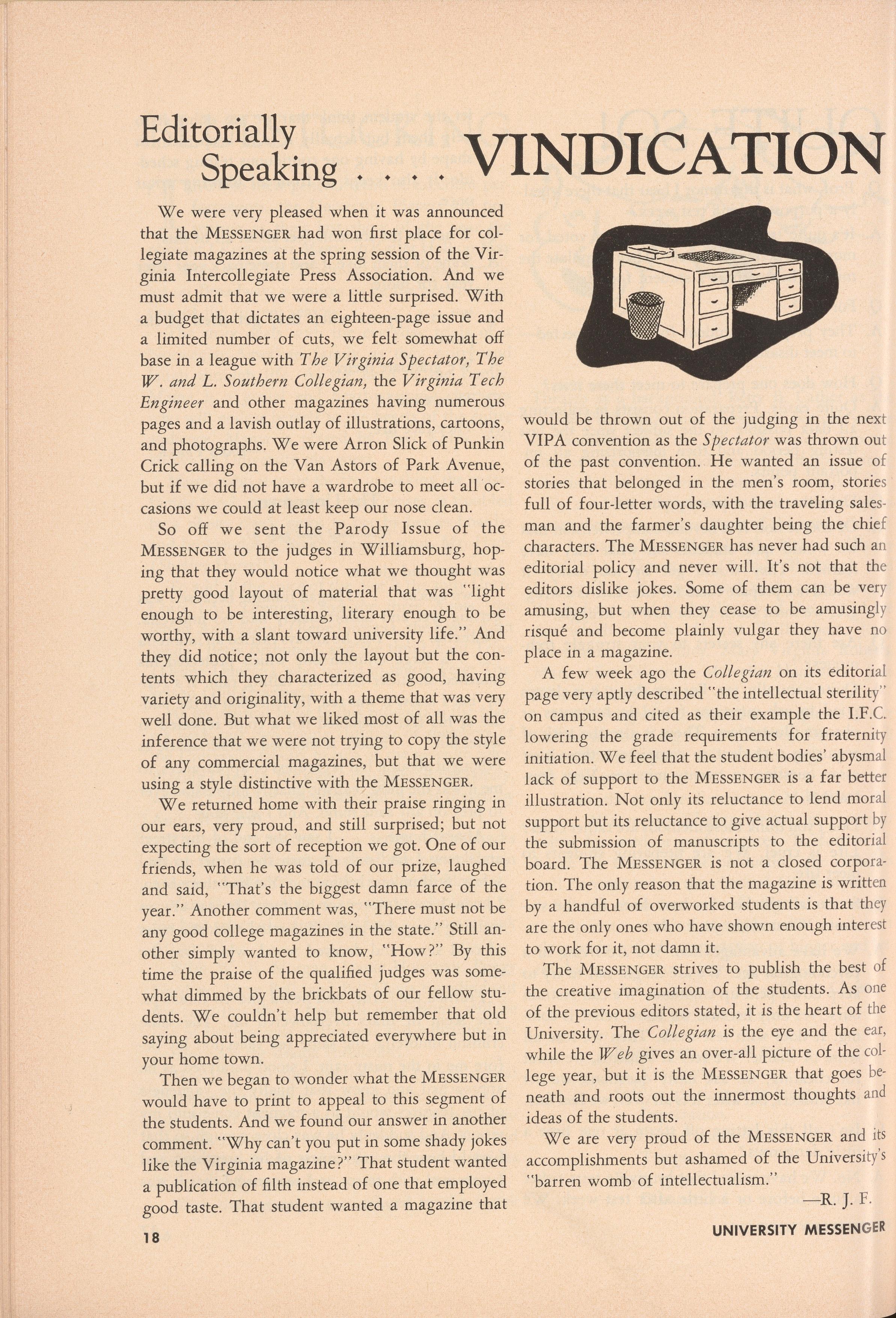
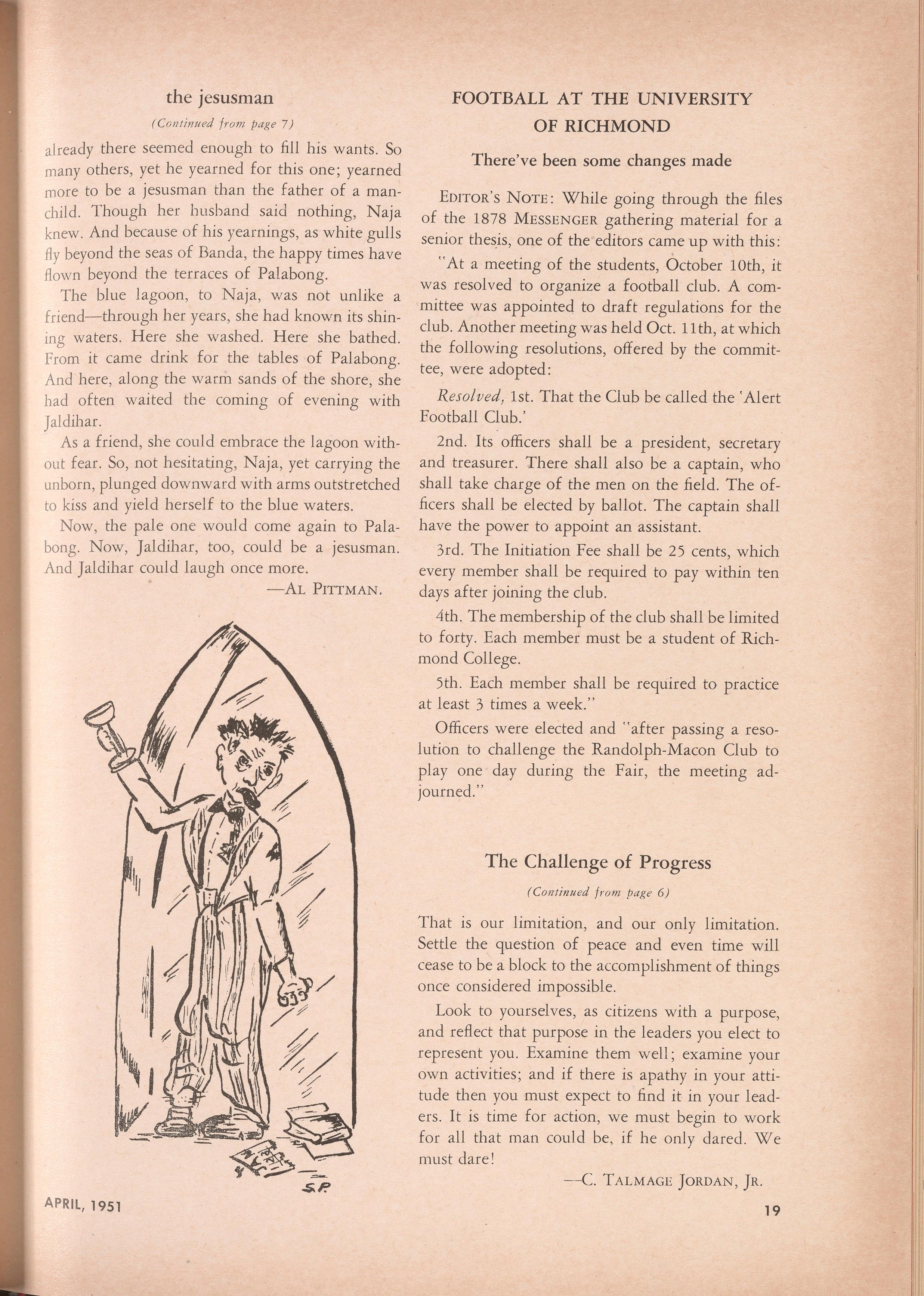
the jesusman (Co11li1?11edfrom page 7) already there seemed enough to fill his wants. So many others, yet he yearned for this one; yearned more to be a jesusman than the father of a manchild. Though her husband said nothing, Naja knew. And because of his yearnings, as white gulls fly beyond the seas of Banda, the happy times have flown beyond the terraces of Palabong.
The blue lagoon , to Naja, was not unlike a friend-through her years, she had known its shining waters. Here she washed. Here she bathed. From it came drink for the tables of Palabong. And here, along the warm sands of the shore, she had often waited the coming of evening with Jaldihar.
As a friend, she could embrace the lagoon without fear. So, not hesitating, Naja , yet carrying the unborn, plunged downward with arms outstretched to kiss and yield herself to the blue waters.
Now, the pale one would come again to Palabong. Now, Jaldihar, too, could be a jesusman. And Jaldihar could laugh once more.
-AL PITTMAN.
There've been some changes made
EDITOR'SNoTE: While going through the files of the 1878 MESSENGERgathering material for a senior thesis, one of the editors can:ie up with this:
"At a meeting of the students, October 10th, it was resolved to organize a football club. A committee was appointee{ to draft regulations for the club. Another meeting was held Oct. 11th, at which the following resolutions, offered by the committee, were adopted:
Resolved, lst. That the Club be called the 'Alert Football Club.'
2nd. Its officers shall be a president, secretary and treasurer. There shall also be a captain, who shall take charge of the men on the field. The officers shall be elected by ballot. The captain shall have the power to appoint an assistant.
3rd. The Initiation Fee shall be 25 cents, which every member shall be required to pay within ten days after joining the club.
4th. The membership of the club shall be limited to forty Each member must be a student of Richmond College.
5th. Each member shall be required to practice at least 3 times a week."
Officers were elected and "after passing a resolution to challenge the Randolph-Macon Club to play one day during the Fair, the meeting adjourned."
(Continued from ,/Jage 6)
That is our limitation, and our only limitation. Settle the question of peace and even time will cease to be a block to the accomplishment of things once considered impossible.
Look to yourselves, as citizens with a purpose, and reflect that purpose in the leaders you elect to represent you. Examine them well; examine your own activities; and if there is apathy in your attitude then you must expect to find it in your leaders. It is time for action, we must begin to work for all that man could be, if he on! y dared. We must dare~
-C. TALMAGEJORDAN,JR.
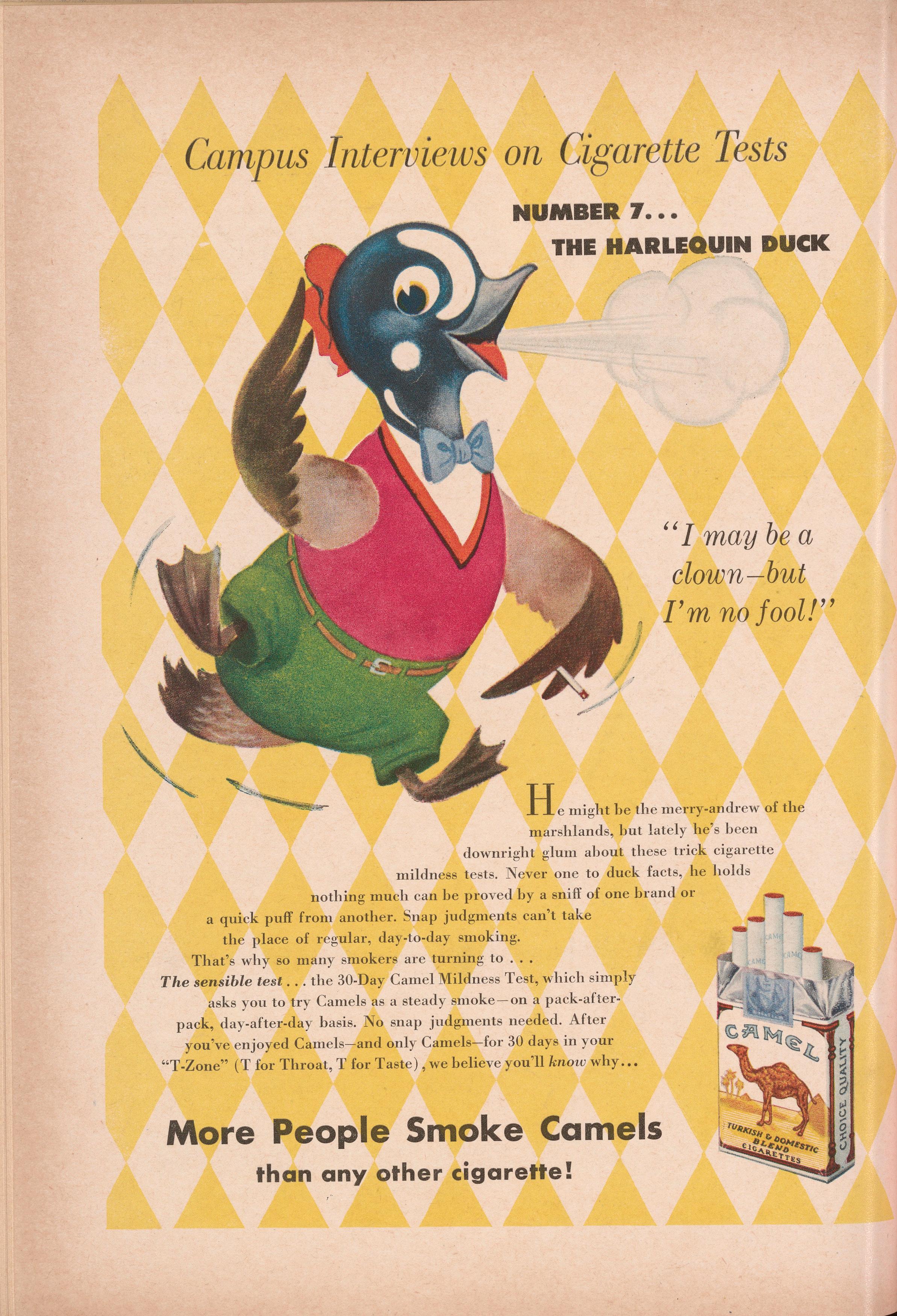
"I may be a clown- but I'm no fool!"
He might be the merry-andrew of the marshlands, but lately he's been downright glum about these trick cigarette mildness tests . Never one to duck facts, he holds nothing much can be proved by a sniff of one brand or a quick puff from another. Snap judgments can't take the place of regular, day -to -day smoking. That's w h y so many smokers are turning to
T h e sens i ble test . the 30 -Day Camel Mildness Test, which simply asks you to try Camels as a steady smoke-on a pack -afterpack, day -after -day bas i s. No snap judgments needed . After you've enjoyed Camels-and only Camels-for 30 days in your "T-Zone" (T for Throat, T for Taste), we believe you'll know why ..• More People Smoke Camels th a n any other cigarette!